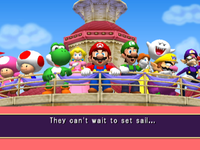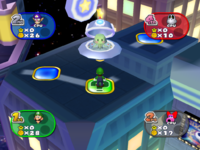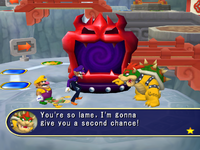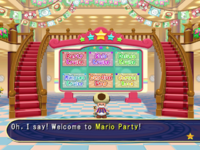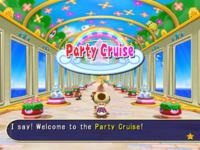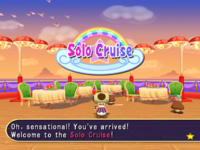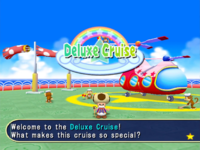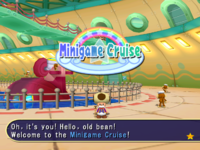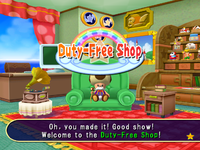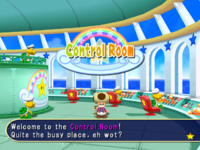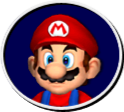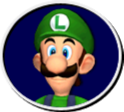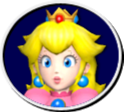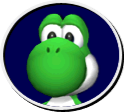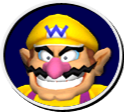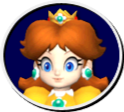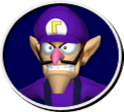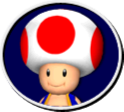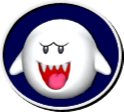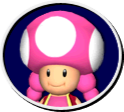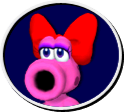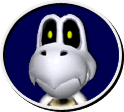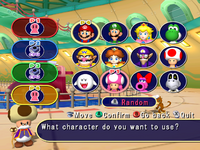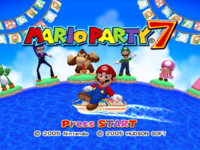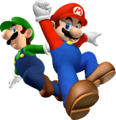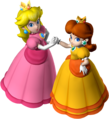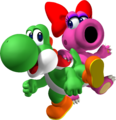Mario Party 7: Difference between revisions
BuilderBosc (talk | contribs) m (→Thrown Orbs: minor visual error fixed) |
|||
| (139 intermediate revisions by 51 users not shown) | |||
| Line 1: | Line 1: | ||
{{italic title}} | {{italic title}} | ||
{{ | {{game infobox | ||
|image=[[File:MP7 - Box NA.jpg|250px]]<br>North American box art | |image=[[File:MP7 - Box NA.jpg|250px]]<br>North American box art | ||
|developer=[[Hudson Soft]]<br> [[CAProduction]]<br>[[Nintendo Software Planning & Development|Nintendo SPD Group No.4]] | |developer=[[Hudson Soft]]<br> [[CAProduction]]<br>[[Nintendo Software Planning & Development|Nintendo SPD Group No.4]] | ||
|publisher=[[Nintendo]] | |publisher=[[Nintendo]] | ||
| | |release={{flag list|USA|November 7, 2005|Japan|November 10, 2005|Europe|January 27, 2006|Australia|June 8, 2006}} | ||
|languages={{languages|en_us=y|es_es=y|fr_fr=y|de=y|it=y|jp=y}} | |||
|genre=[[Genre#Party|Party]] | |genre=[[Genre#Party|Party]] | ||
|modes=1-8 players | |modes=1-8 players | ||
|ratings={{ratings|acb=pg|cero=a|esrb=e|pegi=3}} | |ratings={{ratings|acb=pg|cero=a|esrb=e|pegi=3|usk=0}} | ||
|platforms=[[Nintendo GameCube]] | |platforms=[[Nintendo GameCube]] | ||
| | |format={{format|gcn=1}} | ||
|input={{input| | |input={{input|gcn=1|gcnmicrophone=1}} | ||
|serials={{flag list|Japan|DOL-GP7J-JPN|USA|DOL-GP7E-USA|Europe|DOL-GP7P-EUR}} | |||
}} | }} | ||
'''''Mario Party 7''''' is a [[Genre#Party|party]] game from the [[Mario Party (series)|''Mario Party'' series]], released for the [[Nintendo GameCube]] console. It is the seventh ''Mario Party'' home console installment (and the twelfth installment in the overall ''Mario Party'' series), and the fourth and final ''Mario Party'' installment for the Nintendo GameCube. It was first released in North America and Japan in | '''''Mario Party 7''''' is a [[Genre#Party|party]] game from the [[Mario Party (series)|''Mario Party'' series]], released for the [[Nintendo GameCube]] console. It is the seventh ''Mario Party'' home console installment (and the twelfth installment in the overall ''Mario Party'' series), and the fourth and final ''Mario Party'' installment for the Nintendo GameCube. It was first released in North America and Japan in November 2005, before being released in Europe, Australia, and the United Kingdom in early to mid-2006. This was the last ''[[Super Mario (franchise)|Super Mario]]'' game released for the Nintendo GameCube in Europe and Australia; in Japan and North America, ''[[Super Mario Strikers]]'' holds this distinction. | ||
Like the previous ''Mario Party'' installments, the game is laid out as an interactive board game, where players use [[Dice Block]]s to advance in the board, while also playing various minigames. In this game, [[Mario]] and the gang, using the [[MSS Sea Star]], go vacationing to locations based on landmarks on [[Earth]]. However, [[Bowser]] is not invited on the cruise and decides to cause trouble for Mario and his friends. | Like the previous ''Mario Party'' installments, the game is laid out as an interactive board game, where players use [[Dice Block]]s to advance in the board, while also playing various minigames. In this game, [[Mario]] and the gang, using the [[MSS Sea Star]], go vacationing to locations based on landmarks on [[Earth]]. However, [[Bowser]] is not invited on the cruise and decides to cause trouble for Mario and his friends. | ||
Up to four players can enjoy the most of the game's modes; however, a special mode that this game introduces to the ''Mario Party'' series allows up to eight players to participate in a party. Players are required to share their controllers, and thus, controls are simplified in such modes. | Up to four players can enjoy the most of the game's modes; however, a special mode that this game introduces to the ''Mario Party'' series allows up to eight players to participate in a party. Players are required to share their controllers, and thus, controls are simplified in such modes. ''Mario Party 7'' also makes greater use of the [[Nintendo GameCube#Nintendo GameCube Microphone|microphone]], first introduced in the game's predecessor, ''[[Mario Party 6]]''; being used in certain modes and minigames. ''Mario Party 7'' requires 6 blocks on the Memory Card to save the game, and up to three game files can be saved. | ||
==Story== | ==Story== | ||
| Line 27: | Line 29: | ||
[[File:Mario-party-7-setsail.png|thumb|left|The playable characters about to embark on their cruise]] | [[File:Mario-party-7-setsail.png|thumb|left|The playable characters about to embark on their cruise]] | ||
One morning, Mario is | One morning, Mario is taking his morning walk when he meets [[Toadsworth]], who invites Mario and all his friends to go on a luxury cruise around the world. However, Toadsworth ends up excluding [[Bowser]] from the invitation. Furious due to being omitted, Bowser vows revenge. When the cruise ship, the [[MSS Sea Star]], arrives at its first destination, the passengers discover that Bowser has turned their vacation paradise into a stress-filled place of pandemonium. | ||
After conquering the boards, the player enters Bowser's Castle for their final showdown against Bowser, in which they eventually are able to use the power of the Stars they gathered to send Bowser and the Koopa Kid crashing down. The epilogue sees the | After conquering the boards, the player enters Bowser's Castle for their final showdown against Bowser, in which they eventually are able to use the power of the Stars they gathered to send Bowser and the Koopa Kid crashing down. The epilogue sees the two landing on a tiny island with a tree and feeling dizzy afterwards until they catch sight of the player, who is waving at the duo from aboard the MSS Sea Star as Bowser says that he will not forget this. | ||
{{br|left}} | {{br|left}} | ||
| Line 36: | Line 38: | ||
''Mario Party 7'' features game boards on which players and CPU characters move around on spaces similar to a board game. Players roll the [[Dice Block]] with numbers from one to ten to advance on the board. At the beginning of the game, players can hear an explanation of the board's objective, as well as various other quirks the board may have. The turn order is then determined by a Dice Block roll, with the higher numbers going sooner. Each player starts off with ten [[coin]]s, and the number of coins is affected by the spaces that the player lands on after their turn, as well as multiple other factors. For example, landing on a [[Blue Space]] gives a player three coins, while landing on a [[Red Space]] takes three coins away. The boards feature a variety of spaces that have different effects, and players can collect items known as [[Orb]]s (a feature returning from ''Mario Party 6'') from [[Orb Space]]s, buying them at [[Orb Hut]]s, or winning them from [[Event Space|Green Space]]s. The items can be used to have different effects, which help players or hinder an opponent's progress. | ''Mario Party 7'' features game boards on which players and CPU characters move around on spaces similar to a board game. Players roll the [[Dice Block]] with numbers from one to ten to advance on the board. At the beginning of the game, players can hear an explanation of the board's objective, as well as various other quirks the board may have. The turn order is then determined by a Dice Block roll, with the higher numbers going sooner. Each player starts off with ten [[coin]]s, and the number of coins is affected by the spaces that the player lands on after their turn, as well as multiple other factors. For example, landing on a [[Blue Space]] gives a player three coins, while landing on a [[Red Space]] takes three coins away. The boards feature a variety of spaces that have different effects, and players can collect items known as [[Orb]]s (a feature returning from ''Mario Party 6'') from [[Orb Space]]s, buying them at [[Orb Hut]]s, or winning them from [[Event Space|Green Space]]s. The items can be used to have different effects, which help players or hinder an opponent's progress. | ||
After each player has completed their turn, a minigame is played. The type of the minigame is determined by the colors of the spaces that the players ended their turn on. When all colors match, a 4-Player minigame is played, otherwise there is a 1-Vs-3 or a 2-Vs-2 minigame. In ''Mario Party 7'', minigames | After each player has completed their turn, a minigame is played. The type of the minigame is determined by the colors of the spaces that the players ended their turn on. When all colors match, a 4-Player minigame is played, otherwise there is a 1-Vs-3 or a 2-Vs-2 minigame. In ''Mario Party 7'', minigames may involve clearing action courses, solving puzzles faster than the other players, or fighting against each other, but all rules and controls vary between minigames. Several minigames use the [[Nintendo GameCube#Nintendo GameCube Microphone|Nintendo GameCube Microphone]] that is shipped with the game and plugs into Memory Card Slot B. Players can play microphone minigames without the device by adjusting the game settings. Winning players earn ten coins; however, some minigames are dependent on their category, such as the special Bonus minigames (which are mixed in with the normal minigame categories; they are marked by a yellow name), Battle minigames, Duel minigames, DK minigames, and Bowser minigames. Various minigames have specific conditions to play in them: Battle minigames occur at random, rare intervals where players have their coins put at stake and the reward is dependent on how well the player has done. Duel minigames are triggered by [[Duel Space]]s, where players can win Duel minigames for a prize picked by a roulette, a change from the two preceding installments, ''[[Mario Party 5]]'' and ''[[Mario Party 6]]'', where players are required to put coins and Stars at stake to play. DK and Bowser minigames occur when players land on their respective places; a new feature exclusive to ''Mario Party 7'' is that single-player DK and Bowser minigames are thrown into the mix of multiplayer DK and Bowser minigames. Once a minigame after every turn is completed, the game is saved and players resume their turns on the board. | ||
[[File:BowserConfrontingTheLosingTeam.png|thumb|left|The Last Four Turns Event, where the losing player or team are invited to spin the roulette wheel.]] | [[File:BowserConfrontingTheLosingTeam.png|thumb|left|The Last Four Turns Event, where the losing player or team are invited to spin the roulette wheel.]] | ||
At the last four turns, the [[Last Five Turns Event|Last Four Turns Event]] occurs. Bowser appears to give Koopa Kid the current standings, while also inviting the last player or team to spin the bonus wheel. Some of the effects can help or hinder the players on the board, where one of them triples coins earned on Blue and Red Spaces while others involve Bowser Spaces being placed on all Red Spaces. | At the last four turns, the [[Last Five Turns Event|Last Four Turns Event]] occurs. Bowser appears to give Koopa Kid the current standings, while also inviting the last player or team to spin the bonus wheel. Some of the effects can help or hinder the players on the board, where one of them triples coins earned on Blue and Red Spaces while others involve Bowser Spaces being placed on all Red Spaces. | ||
| Line 42: | Line 44: | ||
The main objective of any ''Mario Party'' game is to gain [[Star (Mario Party series)|Stars]] that are located at a special location in the board. In ''Mario Party 7'', each board offers its unique way to obtain stars, unlike most preceding games in the ''Mario Party'' series where there is only one way to obtain stars. At the end of every game, Toadsworth announces the game's current Star count and final coin count. After that, there will be three [[Bonus Star]]s for the players who did the best during the course of the game. The player with the most Stars overall wins the game. If there is a tie for Stars, then the winner will be decided with coins (Dice Blocks if the final coin count is the same). | The main objective of any ''Mario Party'' game is to gain [[Star (Mario Party series)|Stars]] that are located at a special location in the board. In ''Mario Party 7'', each board offers its unique way to obtain stars, unlike most preceding games in the ''Mario Party'' series where there is only one way to obtain stars. At the end of every game, Toadsworth announces the game's current Star count and final coin count. After that, there will be three [[Bonus Star]]s for the players who did the best during the course of the game. The player with the most Stars overall wins the game. If there is a tie for Stars, then the winner will be decided with coins (Dice Blocks if the final coin count is the same). | ||
A new addition to the board gameplay is [[Bowser Time]]. After each turn, a special gauge representing Bowser's head appears on the screen to tell the player when that time comes; the meter fills up every turn. When the gauge is filled, Bowser Time is initiated. During this special event, [[Bowser]] comes to the board and causes trouble in various ways | A new addition to the board gameplay is [[Bowser Time]]. After each turn, a special gauge representing Bowser's head appears on the screen to tell the player when that time comes; the meter fills up every turn. When the gauge is filled, Bowser Time is initiated. During this special event, [[Bowser]] comes to the board and causes trouble in various ways; some are general while others are specific to the board being played on. This special event happens every five turns; in the Last Four Turns event, the gauge stops appearing after every turn. | ||
After every session, whether on board gameplay in Party Cruise or playing minigames in Minigame Cruise, [[Cruise Mileage Point]]s are earned. These are used to spend on various items at the Duty-Free Shop. | After every session, whether on board gameplay in Party Cruise or playing minigames in Minigame Cruise, [[Cruise Mileage Point]]s are earned. These are used to spend on various items at the Duty-Free Shop. | ||
| Line 49: | Line 51: | ||
===Game modes=== | ===Game modes=== | ||
[[File:Main Menu MP7.png|thumb|left|The main menu selection screen]] | |||
Toadsworth is the host of ''Mario Party 7'', and he guides players through the various modes of the game. At the main menu selection screen, players can get a small description for each of the six game modes and navigate different ways to play through this screen. The game modes are themed after pleasure voyages on a ship and a ship's various locations. | Toadsworth is the host of ''Mario Party 7'', and he guides players through the various modes of the game. At the main menu selection screen, players can get a small description for each of the six game modes and navigate different ways to play through this screen. The game modes are themed after pleasure voyages on a ship and a ship's various locations. | ||
| Line 69: | Line 72: | ||
Players can access the pause menu by pressing {{button|gcn|start}}. Here, players can view how many turns they have left, how full the Bowser Time gauge is, and toggle more settings. These are the following settings available: | Players can access the pause menu by pressing {{button|gcn|start}}. Here, players can view how many turns they have left, how full the Bowser Time gauge is, and toggle more settings. These are the following settings available: | ||
*'''Player Control:''' Players can switch | *'''Player Control:''' Players can switch between a character being human- or CPU-controlled and the CPU difficulty through this menu. Unlike previous ''Mario Party'' games, at least one character must be human-controlled. | ||
*'''Minigame Instructions:''' Players can choose to view or skip minigame instructions. | *'''Minigame Instructions:''' Players can choose to view or skip minigame instructions. | ||
*'''CPU Minigames:''' Players can choose to view or skip minigames | *'''CPU Minigames:''' Players can choose to view or skip minigames and board events only involving CPU players. | ||
*'''Minigame Sets:''' Players can change the current minigame set to All, Easy, Action, Skill, or Weird games. | *'''Minigame Sets:''' Players can change the current minigame set to All, Easy, Action, Skill, or Weird games. | ||
*'''Rumble Feature:''' Players can toggle controller rumbling on or off. | *'''Rumble Feature:''' Players can toggle controller rumbling on or off. | ||
*'''Message Speed:''' This setting can change the speed messages are displayed. The speeds are slow, normal, and fast. | *'''Message Speed:''' This setting can change the speed messages are displayed. The speeds are slow, normal, and fast. | ||
*'''Mic:''' Players can | *'''Mic:''' Players can turn the mic on (to play Mic minigames using an actual mic), set it as controller (to play Mic minigames using {{button|gcn|R}} to bring up a menu) or turn it off (to turn off Mic minigames). | ||
*'''Quit:''' This quits the game and returned to the mode selection screen. Players can choose to leave off where the game was last saved. | *'''Quit:''' This quits the game and returned to the mode selection screen. Players can choose to leave off where the game was last saved. | ||
| Line 82: | Line 85: | ||
Solo Cruise is the single player mode of this game, though up to two players can participate. The gameplay is very similar to Party Cruise save for several key differences. All games pit one player against another player, either controlled by the CPU or a human player, though players need to play against the CPU player in order to progress through this mode. When players first start the mode out, they are required to register a character and name as player data. Players can also create their own pregame and victory messages. | Solo Cruise is the single player mode of this game, though up to two players can participate. The gameplay is very similar to Party Cruise save for several key differences. All games pit one player against another player, either controlled by the CPU or a human player, though players need to play against the CPU player in order to progress through this mode. When players first start the mode out, they are required to register a character and name as player data. Players can also create their own pregame and victory messages. | ||
Once everything is set up, players can pick a board; these boards are shorter than Party Cruise and offer different objectives than Party Cruise's objectives. For example, in order to win in [[Pyramid Park]], a player needs to retrieve the stolen Star and give it back to the Bowser Sphinx. The spaces also give a slightly different coin amount to a player upon landing on one in this mode. [[Blue Space]]s give 5 coins, [[Red Space]]s take 5 coins, and [[Character Space]]s give 10 coins. If 30 turns have passed and no player has cleared the objective yet, the game will end in a tie. Bowser only steals half of the player's coins if they lose a Bowser minigame. Bowser Time does not appear in this mode, and Bowser does not scatter three Koopa Kid Orbs across the board. | Once everything is set up, players can pick a board; these boards are shorter than Party Cruise and offer different objectives than Party Cruise's objectives. For example, in order to win in [[Pyramid Park]], a player needs to retrieve the stolen Star and give it back to the [[Bowser Sphinx]]. The spaces also give a slightly different coin amount to a player upon landing on one in this mode. [[Blue Space]]s give 5 coins, [[Red Space]]s take 5 coins, and [[Character Space]]s give 10 coins. If 30 turns have passed and no player has cleared the objective yet, the game will end in a tie. Bowser only steals half of the player's coins if they lose a Bowser minigame. Bowser Time does not appear in this mode, and Bowser does not scatter three Koopa Kid Orbs across the board. | ||
Players need to clear all boards against the CPU player before they can unlock Bowser's board, [[Bowser's Enchanted Inferno!]]. If they win Bowser's minigame, [[Bowser's Lovely Lift!]], against the CPU, they unlock the board, become the Solo Cruise champion and can leave their name and comment on the ranking board. | Players need to clear all boards against the CPU player before they can unlock Bowser's board, [[Bowser's Enchanted Inferno!]]. If they win Bowser's minigame, [[Bowser's Lovely Lift!]], against the CPU, they unlock the board, become the Solo Cruise champion and can leave their name and comment on the ranking board. | ||
====Deluxe Cruise==== | ====Deluxe Cruise==== | ||
[[File: | [[File:Deluxe Cruise Welcoming.png|thumb|Toadsworth introducing players to Deluxe Cruise]] | ||
Deluxe Cruise is a mode specifically created for 8 player support in ''Mario Party 7''. In this mode, players need to share their controllers with another person; one player controls {{button|gcn|L}} and {{button|gcn|stick}} while the other player controls {{button|gcn|R}} and {{button|gcn|C}}. Players can then choose the number of human or CPU players playing, up to 8 different characters, and then choose from two of the available game modes. | Deluxe Cruise is a mode specifically created for 8 player support in ''Mario Party 7''. In this mode, players need to share their controllers with another person; one player controls {{button|gcn|L}} and {{button|gcn|stick}} while the other player controls {{button|gcn|R}} and {{button|gcn|C}}. Players can then choose the number of human or CPU players playing, up to 8 different characters, and then choose from two of the available game modes. | ||
*'''8-Player Free Play:''' Players can freely choose one of the 12 available 8-player minigames to play. Unlike the Free-Play Sub in Minigame Cruise, all 12 minigames are available from the start. | *'''8-Player Free Play:''' Players can freely choose one of the 12 available 8-player minigames to play. Unlike the Free-Play Sub in Minigame Cruise, all 12 minigames are available from the start. | ||
| Line 99: | Line 102: | ||
Players can play with the minigames they have unlocked in Party Cruise or Solo Cruise. Up to four players can participate playing one of the six modes specifically designed around minigames. | Players can play with the minigames they have unlocked in Party Cruise or Solo Cruise. Up to four players can participate playing one of the six modes specifically designed around minigames. | ||
*'''[[Free Play Sub]]''' - Players are able to play any unlocked minigame they choose. They may also obtain 2 Rare minigames by purchasing them in the [[Duty-Free Shop]], which can be played only in the Free Play Sub. | *'''[[Free Play Sub]]''' - Players are able to play any unlocked minigame they choose. They may also obtain 2 Rare minigames by purchasing them in the [[Duty-Free Shop]], which can be played only in the Free Play Sub. | ||
*'''Volcano Peril''' - As the name suggests, this mode takes place in a volcano. After picking the number of victories (3, 5, 7) and the type of minigames (4-Player, 2-Vs.-2, 1-Vs.-3), the four characters race from some bolts. After each game, the character(s) who won rise one level. There is no penalty for losing. The first character (or team) to beat the required amount of games wins. They escape(s) from the volcano while the others get trapped in the skeleton of a dinosaur. In the sky, a [[Shy Guy]] on an airplane flies back and forth, spewing stars made out of smoke from the back. To play this game, players need to unlock at least one 4-Player, 1-Vs.-3, | *'''Volcano Peril''' - As the name suggests, this mode takes place in a volcano. After picking the number of victories (3, 5, 7) and the type of minigames (4-Player, 2-Vs.-2, 1-Vs.-3), the four characters race from some bolts. After each game, the character(s) who won rise one level. There is no penalty for losing. The first character (or team) to beat the required amount of games wins. They escape(s) from the volcano while the others get trapped in the skeleton of a dinosaur. In the sky, a [[Shy Guy]] on an airplane flies back and forth, spewing stars made out of smoke from the back. To play this game, players need to unlock at least one 4-Player, 1-Vs.-3, and 2-Vs.-2 minigame. | ||
*'''Waterfall Battle''' - | *'''Waterfall Battle''' - In order to win, a player must beat every other player in a Duel minigame. Players that lost a minigame have a chance for a comeback victory, if the person they lost against gets beaten. The game is won when there are no other players left to battle. In order to play this mode, at least one Duel minigame has to be unlocked. | ||
*'''Pearl Hunt''' - Four characters are placed in a capsule underwater while seashells are placed around them. After beating a minigame, whoever won can select a shell. If it is a pearl with the winner's face on it, that player collects it. However, if it is not the winner's face, the shell closes. The player can find [[Mushroom]]s or [[Super Mushroom]]s to choose additional shells in a turn, a [[Bob-omb]] that briefly opens surrounding shells, or whirlpools that shuffles the order of the shells. The first one to collect three pearls that have their image on it wins the game, then appears in a giant shell, while the others are chased around by a shark. To play Pearl Hunt, players need to unlock at least one 4-Player minigame. If more than one person wins or it is a tie, nobody gets to open a shell. | *'''Pearl Hunt''' - Four characters are placed in a capsule underwater while seashells are placed around them. After beating a minigame, whoever won can select a shell. If it is a pearl with the winner's face on it, that player collects it. However, if it is not the winner's face, the shell closes. The player can find [[Mushroom]]s or [[Super Mushroom]]s to choose additional shells in a turn, a [[Bob-omb]] that briefly opens surrounding shells, or whirlpools that shuffles the order of the shells. The first one to collect three pearls that have their image on it wins the game, then appears in a giant shell, while the others are chased around by a shark. To play Pearl Hunt, players need to unlock at least one 4-Player minigame. If more than one person wins or it is a tie, nobody gets to open a shell. | ||
*'''Decathlon Castle''' - Players play ten | *'''Decathlon Castle''' - Players play from a set of ten minigames to earn the most points, dependent on how well they performed in the minigame. The game can be played in two ways: players can either play from the standard ten minigames or from five randomly selected minigames. Since each minigame gives up to a maximum of 1000 points, top scores are only saved when the standard ten minigames ruleset is played. Players can view their top scores in the Duty-Free Shop. The following minigames must be unlocked to play this game: [[Track & Yield]], [[Fun Run]], [[Snow Ride]], [[Target Tag]], [[Pokey Pummel]], [[Take Me Ohm]], [[Kart Wheeled]], [[Helipopper]], [[Monty's Revenge]], and [[Air Farce]]. | ||
*'''King of the River''' (unlockable) - This mode is a game for one player only. Single players play a set of minigames with a limited supply of lives. Each time the player fails to win a minigame, one life is lost; if all lives are lost, the game ends. Koopa Kid shows up between 6-10 minigames, 16-20 minigames, and 26-30 minigames with a multiplayer Bowser minigame. On every five minigames, players can save their progress. It is also possible to recover any lives that are lost, but players cannot hold more than three lives. As the player plays through this game mode, they can advance to higher difficulty levels. For each difficulty level cleared, the player receives a souvenir, which will then be placed in the Duty-Free Shop | *'''King of the River''' (unlockable) - This mode is a game for one player only. Single players play a set of minigames with a limited supply of lives. Each time the player fails to win a minigame, one life is lost; if all lives are lost, the game ends. Koopa Kid shows up between 6-10 minigames, 16-20 minigames, and 26-30 minigames with a multiplayer Bowser minigame. On every five minigames, players can save their progress. It is also possible to recover any lives that are lost, but players cannot hold more than three lives. As the player plays through this game mode, they can advance to higher difficulty levels. For each difficulty level cleared, the player receives a souvenir, which will then be placed in the Duty-Free Shop. The prize received on hard difficulty is a star statue, and when it is accessed in the Duty Free Shop, the surprise action is the end credits. | ||
====Duty-Free Shop==== | ====Duty-Free Shop==== | ||
| Line 120: | Line 123: | ||
==Playable characters== | ==Playable characters== | ||
''Mario Party 7'' has twelve playable characters. All playable characters from ''[[Mario Party 6]]'' return except [[Koopa Kid]], who has returned to having a non-playable role. The newcomers, as well as the unlockable characters, are Birdo and Dry Bones. In order to unlock them, the player has to spend 1,000 Cruise Mileage Points for each of them at the [[Duty-Free Shop]]. | |||
All playable characters from ''[[Mario Party 6]]'' except [[Koopa Kid]] | <gallery widths=124 heights=112 perrow=4> | ||
Mario Face 7.png|[[Mario]] | |||
<gallery perrow=4> | Luigi Face 7.png|[[Luigi]] | ||
Mario Face 7.png| | Peach Face 7.png|[[Princess Peach|Peach]] | ||
Luigi Face 7.png| | Yoshi Face 7.png|[[Yoshi]] | ||
Peach Face 7.png| | Wario Face 7.png|[[Wario]] | ||
Yoshi Face 7.png| | Daisy Face 7.png|[[Princess Daisy|Daisy]] | ||
Wario Face 7.png| | Waluigi Face 7.png|[[Waluigi]] | ||
Daisy Face 7.png| | Toad Face 7.png|[[Toad]] | ||
Waluigi Face 7.png| | Boo MP 7.png|[[Boo]] | ||
Toad Face 7.png| | Toadette Face 7.png|[[Toadette]] | ||
Boo MP 7.png| | Birdo Face 7.png|[[Birdo]] (new) | ||
Toadette Face 7.png| | Dry Bones Face 7.png|[[Dry Bones]] (new) | ||
Birdo Face 7.png| | |||
Dry Bones Face 7.png| | |||
</gallery> | </gallery> | ||
===Default partners=== | ===Default partners=== | ||
Each pair of partners have their own special | [[File:Mario Party 7 Char Select.png|thumb|The character select screen showing all characters available.]] | ||
Each pair of partners have their own special Orbs. If two non-default characters are on the same team, they can both receive their special Orbs, but the special Orbs can be obtained and used only by the designated players. For example, if Mario and Peach are on the same team, Peach can share her special [[Flower Orb]] with Mario, but only she can obtain it and use it. | |||
*Mario and Luigi | *Mario and Luigi | ||
* | *Peach and Daisy | ||
*Wario and Waluigi | *Wario and Waluigi | ||
*Toad and Toadette | *Toad and Toadette | ||
| Line 148: | Line 150: | ||
===Team names=== | ===Team names=== | ||
[[File:Team Pictures 7.png|thumb | [[File:Team Pictures 7.png|thumb]] | ||
Special team names for each pair do not return in this ''Mario Party'' installment, unlike its predecessors ''[[Mario Party 5]]'' and ''[[Mario Party 6|6]]''. Rather, they are represented by various marine animals by team order: | Special team names for each pair do not return in this ''Mario Party'' installment, unlike its predecessors ''[[Mario Party 5]]'' and ''[[Mario Party 6|6]]''. Rather, they are represented by various marine animals by team order: | ||
*'''{{color|Team Dolphin | *'''{{color|gold|Team Dolphin}}''' (Japanese: イルカチーム): The first team in Tag Battle and 4-Team Battle. | ||
*'''{{color|Team Seagull | *'''{{color|green|Team Seagull}}''' (Japanese: カモメチーム): The second team in Tag Battle and 4-Team Battle. | ||
*'''{{color|Team Tuna | *'''{{color|blue|Team Tuna}}''' (Japanese: おさかなチーム): The third team in 4-Team Battle. | ||
*'''{{color|Team Mollusk | *'''{{color|red|Team Mollusk}}''' (Japanese: かいがらチーム): The fourth team in 4-Team Battle. | ||
{{br}} | {{br}} | ||
==Boards== | ==Boards== | ||
{ | {{content description | ||
| | |name1={{sort|Grand Canal|[[File:MP7 Grand Canal Logo.png|link=Grand Canal|200px]]}} | ||
|image1=[[File:Gcanal.jpg|200px]] | |||
|description1=[[Grand Canal]] is a board based on Venice, Italy. In Party Cruise, players can buy Stars at random, set locations for 20 coins. Once a star has been purchased, the Star Space travels to a different location on the board. In Solo Cruise, the first player to collect two Stars wins. | |||
|name2={{sort|Pagoda Peak|[[File:Pagoda Peak Logo.png|link=Pagoda Peak|200px]]}} | |||
| | |image2=[[File:Pagoda Peak - Mario Party 7.png|200px]] | ||
|description2=[[Pagoda Peak]] is a Chinese-themed board. An old Koopa, named the [[Koopa Master]], lives at the top of the mountain. In Party Cruise, he sells a character who reaches the peak of the mountain a Star for the number of coins shown above his house (10, 20, 30, or 40). Each time someone buys a Star from him, the price of each additional Star goes up by ten coins (to a maximum of 40 coins; after that, it restarts to 10). In Solo Cruise, the first player to obtain 100 coins and reach Koopa Master at the peak to trade for the Star wins the game. | |||
|name3={{sort|Pyramid Park|[[File:MP7 Pyramid Park Logo.png|link=Pyramid Park|200px]]}} | |||
|[[Grand Canal]] | |image3=[[File:Ppark.jpg|200px]] | ||
|description3=[[Pyramid Park]] is an Egyptian-themed board. In Party Cruise, the objective of the board is similar to [[Snowflake Lake]] of ''[[Mario Party 6]]'': players need to pay to ride on Chain Chomps to steal Stars from their opponents. There are three [[Chain Chomp]]s on the right side of the board that let players ride on it for a price of ten coins for one Dice Block (or 20 for two), and a big [[Red Chomp]] on the left side located at the top that lets players use three Dice Blocks for ten coins. In Solo Cruise, the player who retrieves the stolen Star and gives it back to the [[Bowser Sphinx]] wins the game. | |||
| | |name4={{sort|Neon Heights|[[File:MP7 Neon Heights Logo.png|link=Neon Heights|200px]]}} | ||
|image4=[[File:Neon Heights - Mario Party 7.png|200px]] | |||
|description4=[[Neon Heights]] is a board based on the United States. On this board, there are three Treasure Chests, which appear in random spots. If a player reaches a chest, Koopa Kid offers to open it for 10 coins. One chest contains a Star, another 20 [[coin]]s, and the other one contains a [[Bob-omb]], which blasts the player back to Start. Once the Star has been purchased, three new chests appear. In Solo Cruise, the first player to obtain three Stars wins the game. | |||
|[[Pagoda Peak]] | |name5={{sort|Windmillville|[[File:MP7 Windmillville Logo.png|link=Windmillville|200px]]}} | ||
|image5=[[File:Windmillville - Mario Party 7.png|200px]] | |||
| | |description5=[[Windmillville]] is a Dutch-themed board. The goal of this board in Party Cruise is to buy as many windmills as possible, for each one contains a number of Stars. The red windmills are worth one Star, the larger green windmills located at both corners of the stage have two, and the largest yellow windmill located in the center of the board has three. Players have to deposit coins to own a windmill and its Stars, but opponents can buy them off by depositing more coins than the previous owner. In Solo Cruise, players need to get stars by depositing coins into broken windmills to fix them. The first player to repair three windmills and get three stars (one for each windmill) wins the game. | ||
|name6={{sort|Bowser's Enchanted Inferno!|[[File:MP7 Bowser's Enchanted Inferno! Logo.png|link=Bowser's Enchanted Inferno!|200px]]}} | |||
|image6=[[File:MP7 Bowser'sEnchantedInferno!.jpg|200px]] | |||
|[[Pyramid Park]] | |description6=[[Bowser's Enchanted Inferno!]] is an unlockable, Bowser-themed board. In Party Cruise, players need to find a Star for 20 coins each, the same rules as Grand Canal. In Solo Mode, players have to beat their opponent by getting a Star with the same rules as Party Cruise, then travel back to the start. Bowser then appears to take players to his castle to play the minigame [[Bowser's Lovely Lift!]]. Winning that wins the game, and unlocks Bowser's board to be played in Party Cruise. | ||
}} | |||
| | |||
|[[Neon Heights]] | |||
| | |||
|[[Windmillville]] | |||
| | |||
![[File:MP7 Bowser's Enchanted Inferno! Logo.png|200px]] | |||
|[[Bowser's Enchanted Inferno!]] | |||
==Spaces== | ==Spaces== | ||
{ | {{content description | ||
|image1=[[File:SpaceBlue7.png]] | |||
|name1=[[Blue Space]] | |||
|description1=When players land on this space, they receive three coins (five coins in Solo Cruise). On the last four turns event, the coins players receive may be tripled. | |||
|image2=[[File:SpaceRed7.png]] | |||
|name2=[[Red Space]] | |||
|description2=When players land on this space, they lose three coins (five coins in Solo Cruise). On the last four turns event, the coins players lose may be tripled. | |||
|[[Blue Space]] | |image3=[[File:SpaceHappening7.png]] | ||
|When players land on this space, they receive three coins (five coins in Solo Cruise). On the last four turns event, the coins players receive | |name3=[[Event Space|Green Space]] | ||
| | |description3=When the player lands on this space, an event happens. The event varies on location and board. The event may help or hinder the player or everyone. | ||
|image4=[[File:SpaceMic.png]] | |||
|[[Red Space]] | |name4=[[Mic Space]] | ||
|When players land on this space, they lose three coins (five coins in Solo Cruise). On the last four turns event, the coins players lose | |description4=Toadsworth appears and starts a Mic minigame, where the player can bet coins and win double the amount back. If the Mic is turned off, the player cannot play the Mic minigame. | ||
| | |image5=[[File:SpaceDuel7.png]] | ||
|name5=[[Duel Space]] | |||
|[[Event Space]] | |description5=When the player lands on this space, the player chooses who to duel with. After the opponent has been chosen, a Duel minigame starts and if the player wins, the loser gives away something to the winner, the prize given is decided by a dice block roll. There is a chance, however, that the dice block will show a red X, which means the losing player does not give anything to the winner. | ||
|When the player lands on this space, an event happens. The event varies on location and board. The event may help or hinder the player or everyone. | |image6=[[File:SpaceDonkey7.png]] | ||
| | |name6=[[Donkey Kong Space]] | ||
|description6=When the player lands on this space, [[Donkey Kong]] appears and starts one of two minigame types. In a Single-Player DK minigame, the player who landed on his space gets a chance to win 20 coins, 30 coins, or even a Star, if the player can beat Donkey Kong in the minigame. In a Multiplayer DK minigame, everyone can collect bananas for coins. The events may help the player or everyone. In Solo Cruise, the chance to win a Star in a Single Player DK minigame is replaced by 10 coins. | |||
|[[Mic Space]] | |image7=[[File:Space KoopaKid MP7.png]] | ||
|Toadsworth | |name7=[[Koopa Kid Space]] | ||
| | |description7=Whenever someone lands on a Koopa Kid Space, Koopa Kid appears and do things such as a Bowser Revolution or Bowser Shuffle. These spaces can be removed by tossing a Roadblock or Thrown Orb at them, or by using the [[Egg Orb]]. On the last four turns event, ten additional Koopa Kid Spaces may be placed on the board. | ||
|image8=[[File:SpaceBowser7.png]] | |||
|[[Duel Space]] | |name8=[[Bowser Space]] | ||
|When the player lands on this space, the player chooses who to duel with. After the opponent has been chosen, a Duel minigame starts and if the player wins, the loser gives away something to the winner, the prize given is decided by a dice block roll. There is a chance, however, that the dice block will show a red X, which means the losing player | |description8=When the player lands on this space, [[Bowser]] appears and starts one of two types of Bowser minigames that can usually hinder the player who lands on this space or everyone. In a Single Player Bowser minigame, the player needs to finish a minigame before time runs out. If the player wins, Bowser will not steal anything from the player. If the player loses, Bowser will either steal half of the player's coins, all of them, or a Star. In a Multiplayer Bowser minigame, everyone needs to get to the finish line in order to clear the minigame. Any losing players will have to forfeit half of their coins, all of them or a Star. In Team Battle, only one member of a team is required to reach the finish line in a Multiplayer Bowser minigame. Additionally, if a player lands on this space and does not have any coins, Bowser will give the player ten coins, and will not start a Bowser minigame. | ||
| | |image9=[[File:Space Mario MP7.png]] | ||
|name9=[[Character Space]] | |||
|[[Donkey Kong Space]] | |description9=This space is created when players toss Thrown or Roadblock Orbs onto Blue or Red spaces. The effect of the space is dependent on the Orb tossed. Owners who land on their space with a Thrown Orb receive 5 coins (10 in Solo Cruise); Roadblock Orbs do not give owners any coins. Other players can overlap Character Spaces with their own Orbs. The character or team emblem represents the owner or owners of the space. | ||
|When the player lands on this space, [[Donkey Kong]] appears and starts one of two minigame types. In a Single-Player DK minigame, the player who landed on his space gets a chance to win 20 coins, 30 coins, or even a Star, if the player | |image10=[[File:CoinBlockArea.png|64px]] | ||
| | |name10=[[Coin Block Area]] | ||
|description10=Appearing only in Solo Cruise, this space gives players coins. It does not count towards the total dice roll. The coin amount given is either 5, 10 or 20 coins. | |||
|[[Koopa Kid Space]] | }} | ||
|Whenever someone lands on a Koopa Kid Space, Koopa Kid | |||
| | |||
|[[Bowser Space]] | |||
|When the player lands on this space, [[Bowser]] appears and starts one of two types of Bowser minigames that can usually hinder the player who lands on this space or everyone. In a Single Player Bowser minigame, the player needs to finish a minigame before time runs out. If the player wins, Bowser will not steal anything from the player. If the player loses, Bowser will either steal half of the player's coins, all of them, or a Star. In a Multiplayer Bowser minigame, everyone needs to get to the finish line in order to clear the minigame. Any losing players will have to forfeit half of their coins, all of them or a Star. In Team Battle, only one member of a team is required to reach the finish line in a Multiplayer Bowser minigame. Additionally, if a player lands on this space and does not have any coins, Bowser will give the player ten coins, and will not start a Bowser minigame. | |||
| | |||
|[[Character Space]] | |||
|This space is created when players toss Thrown or Roadblock Orbs onto Blue or Red spaces. The effect of the space is dependent on the Orb tossed. Owners who land on their space with a Thrown Orb receive 5 coins (10 in Solo Cruise); Roadblock Orbs do not give owners any coins. Other players can overlap Character Spaces with their own Orbs. The character or team emblem represents the owner or owners of the space. | |||
| | |||
|[[Coin Block Area]] | |||
|Appearing only in Solo Cruise, this space gives players coins. It does not count towards the total dice roll. The coin amount given is either 5, 10 or 20 coins. | |||
==Orbs== | ==Orbs== | ||
Orbs make a return from ''[[Mario Party 6]]'', all of their mechanics intact, with the introduction of two new categories of Orbs. As in ''Mario Party 6'', Orbs can be obtained by buying them through [[Orb Shop]]s, passing through [[Orb Space]]s, or winning them through [[ | Orbs make a return from ''[[Mario Party 6]]'', all of their mechanics intact, with the introduction of two new categories of Orbs. As in ''Mario Party 6'', Orbs can be obtained by buying them through [[Orb Shop]]s, passing through [[Orb Space]]s, or winning them through [[Event Space|Green Space]]s. Orbs are used to help assist a player's progress or to hinder opponents. There are five types of Orbs in the game, each with their own distinct category based on their mechanics. Two types of Orbs can be set up as traps: Thrown and Roadblock Orbs. They can be set only in Blue, Red, Character (barring Roadblock Character spaces), or Koopa Kid spaces. | ||
===Self Orbs=== | ===Self Orbs=== | ||
Self Orbs have a green shell and are used on the player. | Self Orbs have a green shell and are used on the player. | ||
{ | {{content description | ||
| | |image1=[[File:Mushroom Orb.jpg]] | ||
|name1=[[Mushroom Orb]] | |||
|description1="''Move with two Dice Blocks.''" | |||
|image2=[[File:Goldshroomorb.jpg|100px]] | |||
|name2=[[Super 'Shroom Orb]] | |||
|description2="''Move with three Dice Blocks.''" | |||
|[[Mushroom Orb]] | |image3=[[File:Sluggish 'Shroom Orb.jpg]] | ||
|"''Move with two Dice Blocks.''" | |name3=[[Slow 'Shroom Orb]] | ||
| | |description3="''The Dice Block will move slowly.''" | ||
|image4=[[File:Metal Mushroom Orb.jpg]] | |||
|[[Super 'Shroom Orb]] | |name4=[[Metal Mushroom Orb]] | ||
|"''Move with three Dice Blocks.''" | |description4="''Encase yourself in metal and move without being harmed by rivals' traps.''" | ||
| | |image5=[[File:Flutter Orb.jpg|100px]] | ||
|name5=[[Flutter Orb]] | |||
|[[Slow 'Shroom Orb]] | |description5="''Flutter will appear and fly you straight to where the Star is!''" (Grand Canal and Bowser's Enchanted Inferno! only) | ||
|"''The Dice Block will move slowly.''" | |image6=[[File:Cannon Orb.jpg|100px]] | ||
| | |name6=[[Cannon Orb]] | ||
|description6="''It'll send you flying to the upper part of the board.''" (Pagoda Peak only) | |||
|[[Metal Mushroom Orb]] | |image7=[[File:Lakitu Orb.jpg|100px]] | ||
|"''Encase yourself in metal and move without being harmed by rivals' traps.''" | |name7=[[Lakitu Orb]] | ||
| | |description7="''Lakitu will bring you a treasure chest!''" (Neon Heights only) | ||
|image8=[[File:Snack Orb2.jpg|100px]] | |||
|[[Flutter Orb]] | |name8=[[Snack Orb]] | ||
|"''Flutter will appear and fly you straight to where the Star is!''" | |description8="''Prevents a Chain-Chomp from stealing you once. Lasts for three turns.''" (Pyramid Park only) | ||
| | }} | ||
|[[Cannon Orb]] | |||
|"''It'll send you flying to the upper part of the board.''" (Pagoda Peak only) | |||
| | |||
|[[Lakitu Orb]] | |||
|"''Lakitu will bring you a treasure chest!''" (Neon Heights only) | |||
| | |||
|[[Snack Orb]] | |||
|"''Prevents a Chain-Chomp from stealing you once. Lasts for three turns.''" (Pyramid Park only) | |||
===Thrown Orbs=== | ===Thrown Orbs=== | ||
Thrown Orbs are traps that can be throw on a space. If an opponent lands on the space, various effects occur. The Thrown Orbs' shell color is yellow. These orbs have an effect on a player who lands on the space. If the owner lands on the space, they will receive five coins. During the last four turns event, they may receive 15 coins if the ×3 coins is chosen on the roulette. The orb stays on the board as long as no one replaces the orb or the Star space does not overlap it. | Thrown Orbs are traps that can be throw on a space. If an opponent lands on the space, various effects occur. The Thrown Orbs' shell color is yellow. These orbs have an effect on a player who lands on the space. If the owner lands on the space, they will receive five coins. During the last four turns event, they may receive 15 coins if the ×3 coins is chosen on the roulette. The orb stays on the board as long as no one replaces the orb or the Star space does not overlap it. | ||
{ | |||
{{content description | |||
|image1=[[File:Hammer Bro. Orb.jpg|100px]] | |||
|name1=[[Hammer Bro Orb]] | |||
|description1="''Take 10 coins from any opponent who lands on it.''" | |||
|image2=[[File:Piranha Plant Orb2.jpg|100px]] | |||
|name2=[[Piranha Plant Orb]] | |||
|[[Hammer Bro Orb]] | |description2="''Any opponent who lands on it must give you half of their coins.''" | ||
|"''Take 10 coins from any opponent who lands on it.''" | |image3=[[File:Spear Guy Orb.jpg|100px]] | ||
| | |name3=[[Spear Guy Orb]] | ||
|description3="''Any opponent who lands on it must give you coins equal to a Dice Block roll.''" | |||
|[[Piranha Plant Orb]] | |image4=[[File:Kamek Orb.jpg|100px]] | ||
|"''Any opponent who lands on it must give you half of their coins.''" | |name4=[[Kamek Orb]] | ||
| | |description4="''If an opponent lands on it, you can take over up to three of his or her character spaces.''" | ||
|image5=[[File:Toady Orb.jpg|100px]] | |||
|[[Spear Guy Orb]] | |name5=[[Toady Orb]] | ||
|"''Any opponent who lands on it must give you coins equal to a Dice Block roll.''" | |description5="''Take an orb from an opponent who lands on it.''" | ||
| | |image6=[[File:Mr. Blizzard Orb2.jpg|100px]] | ||
|name6=[[Mr. Blizzard Orb]] | |||
|[[Kamek Orb]] | |description6="''If an opponent lands on it, he or she will lose every Orb.''" | ||
|"''If an opponent lands on it, you can take over up to three of his or her character spaces.''" | |image7=[[File:Bandit Orb.jpg|100px]] | ||
| | |name7=[[Bandit Orb]] | ||
|description7="''Whoever lands on it will lose coins from a windmill.''" (Windmillville only) | |||
|[[Toady Orb]] | |image8=[[File:Pink Boo Orb.jpg|100px]] | ||
|"''Take an orb from an opponent who lands on it.''" | |name8=[[Pink Boo Orb]] | ||
| | |description8="''A foe who lands here will lose a Star. If the foe doesn't have any stars when they land here, they lose 20 coins.''" | ||
}} | |||
|[[Mr. Blizzard Orb]] | |||
|"''If an opponent lands on it, he or she will lose every Orb.''" | |||
| | |||
|[[Bandit Orb]] | |||
|"''Whoever lands on it will lose coins from a windmill.''" (Windmillville only) | |||
| | |||
|[[Pink Boo Orb]] | |||
|"''A foe who lands here will lose a Star. If the foe doesn't have any stars when they land here, they lose 20 coins.''" | |||
===Roadblock Orbs=== | ===Roadblock Orbs=== | ||
Roadblock Orbs are orbs with red shells and can be thrown on spaces. They are triggered when an opponent passes them and disappear once triggered. | Roadblock Orbs are orbs with red shells and can be thrown on spaces. They are triggered when an opponent passes them and disappear once triggered. | ||
{ | |||
| | {{content description | ||
|image1=[[File:Spiny Orb2.jpg|100px]] | |||
|name1=[[Spiny Orb]] | |||
|description1="''Any opponent who passes it will lose 10 coins.''" | |||
|image2=[[File:Zap Orb2.jpg|100px]] | |||
|name2=[[Zap Orb]] | |||
|[[Spiny Orb]] | |description2="''Any foe who passes it loses three coins for every space he moves past it.''" | ||
|"''Any opponent who passes it will lose 10 coins.''" | |image3=[[File:Tweester Orb.jpg|100px]] | ||
| | |name3=[[Tweester Orb]] | ||
|description3="''Any opponent who passes it will be blown to another space.''" | |||
|[[Zap Orb]] | |image4=[[File:Thwomp Orb2.jpg|100px]] | ||
|"''Any foe who passes it loses three coins for every space he moves past it.''" | |name4=[[Thwomp Orb]] | ||
| | |description4="''Any opponent who passes it will get Thwomped and must stop moving.''" | ||
|image5=[[File:MP7 Warp Pipe Orb.jpg|100px]] | |||
|[[Tweester Orb]] | |name5=[[Warp Pipe Orb]] | ||
|"''Any opponent who passes it will be blown to another space.''" | |description5="''Any opponent who passes it will be warped to the space where they started their movement.''" | ||
| | |image6=[[File:BobombOrb.png|100px]] | ||
|name6=[[Bob-omb Orb]] | |||
|[[Thwomp Orb]] | |description6="''Any opponent caught in the explosion will get thrown for a loop!''" (Pagoda Peak only) | ||
|"''Any opponent who passes it will get Thwomped and must stop moving.''" | }} | ||
| | |||
|[[Warp Pipe Orb]] | |||
|"''Any opponent who passes it will be warped to the space where they started their movement.''" | |||
| | |||
|[[Bob-omb Orb]] | |||
|"''Any opponent caught in the explosion will get thrown for a loop!''" (Pagoda Peak only) | |||
===Character Orbs=== | ===Character Orbs=== | ||
Character Orbs are orbs that only can be used by a specific pair of characters. Their shells are blue and always cost 15 coins at the shop. | Character Orbs are orbs that only can be used by a specific pair of characters. Their shells are blue and always cost 15 coins at the shop. | ||
{|class=sortable | {|class="wikitable sortable" width=100% style="text-align:center" | ||
|- | |- | ||
!width=15%| | !class=unsortable width=15%|Image | ||
!width=17%|Orb | !width=17%|Orb | ||
!width=15%| | !width=15%|Used by | ||
!width= | !class=unsortable width=68%|Description | ||
|- | |- | ||
|[[File:Fireball Orb.jpg|100px]] | |||
|[[Fireball Orb]] | |[[Fireball Orb]] | ||
|Mario and Luigi | |Mario and Luigi | ||
|"''Hit an opponent in front of you to steal his or her coins.''" | |align=left|"''Hit an opponent in front of you to steal his or her coins.''" | ||
|- | |- | ||
|[[File:Flower Orb.jpg|100px]] | |||
|[[Flower Orb]] | |[[Flower Orb]] | ||
|Princess Peach and Princess Daisy | |Princess Peach and Princess Daisy | ||
|"''Spaces ahead of you will change to flower spaces, letting you ignore traps. You get 3 coins for every space you move.''" | |align=left|"''Spaces ahead of you will change to flower spaces, letting you ignore traps. You get 3 coins for every space you move.''" | ||
|- | |- | ||
|[[File:Egg Orb.jpg|100px]] | |||
|[[Egg Orb]] | |[[Egg Orb]] | ||
|Yoshi and Birdo | |Yoshi and Birdo | ||
|"''Eat character spaces and symbols in your path and turn them into eggs. Eggs will become orbs after moving.''" | |align=left|"''Eat character spaces and symbols in your path and turn them into eggs. Eggs will become orbs after moving.''" | ||
|- | |- | ||
|[[File:Vacuum Orb.jpg|100px]] | |||
|[[Vacuum Orb]] | |[[Vacuum Orb]] | ||
|Wario and Waluigi | |Wario and Waluigi | ||
|"''Spin the wheel and take away whatever number you end up with from your opponents.''" | |align=left|"''Spin the wheel and take away whatever number you end up with from your opponents.''" | ||
|- | |- | ||
|[[File:Magic Orb.png|100px]] | |||
|[[Magic Orb]] | |[[Magic Orb]] | ||
|Boo and Dry Bones | |Boo and Dry Bones | ||
|"''Use powerful magic to turn invisible and double your Dice Block rolls for 2 turns.''" | |align=left|"''Use powerful magic to turn invisible and double your Dice Block rolls for 2 turns.''" | ||
|- | |- | ||
|[[File:Normal ball-mushroom.jpg|100px]] | |||
|[[Triple 'Shroom Orb]] | |[[Triple 'Shroom Orb]] | ||
|Toad and Toadette | |Toad and Toadette | ||
|"''Use the power of 3 mushrooms to double your Dice Blocks for 3 turns.''" | |align=left|"''Use the power of 3 mushrooms to double your Dice Blocks for 3 turns.''" | ||
|} | |} | ||
===Other Orbs=== | ===Other Orbs=== | ||
Other Orbs are orbs that are automatically thrown when somebody receives them. They are colored violet and cannot be found in Orb Shops, nor can they be won in Green Spaces. | Other Orbs are orbs that are automatically thrown when somebody receives them. They are colored violet and cannot be found in Orb Shops, nor can they be won in Green Spaces. | ||
{ | |||
{{content description | |||
|image1=[[File:Koopa Kid Orb.jpg|100px]] | |||
|name1=[[Koopa Kid Orb]] | |||
|description1="''If you get this, Koopa Kid will show up and make a Koopa Kid space. How annoying!''" | |||
}} | |||
|[[Koopa Kid Orb]] | |||
|"''If you get this, Koopa Kid will show up and make a Koopa Kid space. How annoying!''" | |||
==Minigames== | ==Minigames== | ||
{{main|List of Mario Party 7 minigames}} | {{main|List of Mario Party 7 minigames}} | ||
[[File:FruitSmoothie.png|thumb|[[Real Smoothie]], an 8-Player minigame | [[File:FruitSmoothie.png|thumb|[[Real Smoothie]], an 8-Player minigame]] | ||
''Mario Party 7'' has 88 minigames, the most of any numbered ''Mario Party'' game | ''Mario Party 7'' has 88 minigames, the most of any numbered ''Mario Party'' game. These include the traditional 4-player minigames, 1-vs.-3 minigames, 2-vs.-2 minigames, duel minigames, and battle minigames. Similarly to its [[Mario Party 6|predecessor]], it employs the [[Nintendo GameCube#Nintendo GameCube Microphone|Nintendo GameCube Microphone]] for several 4-player and 1-vs.-3 minigames. Unique to this game are 8-player minigames. This game also includes DK minigames and Bowser minigames, both of which have three single-player and four-player minigames. Finally, there are two rare minigames and one boss minigame, the latter of which is categorized as a Bowser minigame. | ||
{{br}} | {{br}} | ||
| Line 426: | Line 362: | ||
{{main|Bowser's Lair Hockey}} | {{main|Bowser's Lair Hockey}} | ||
To promote the release of ''Mario Party 7'', a browser game called ''Mario Party 7 -- Bowser's Lair Hockey'' was playable on the ''Mario Party 7'' official site and the [[Nintendo Arcade]]. It is an air hockey game where the player, labeled "NICE", is Toad, and the computer, labeled "MEAN", is Bowser. The game is sixty seconds long, and the player with the most points at the end wins. | To promote the release of ''Mario Party 7'', a browser game called ''Mario Party 7 -- Bowser's Lair Hockey'' was playable on the ''Mario Party 7'' official site and the [[Nintendo Arcade]]. It is an air hockey game where the player, labeled "NICE", is Toad, and the computer, labeled "MEAN", is Bowser. The game is sixty seconds long, and the player with the most points at the end wins. | ||
==Reception== | ==Reception== | ||
===Critical reception=== | ===Critical reception=== | ||
''Mario Party 7'' has received mixed to positive reviews, with aggregate review sites Metacritic scoring it a 64 based on 25 reviews<ref> | ''Mario Party 7'' has received mixed to positive reviews, with aggregate review sites Metacritic scoring it a 64 based on 25 reviews<ref>{{cite|url=www.metacritic.com/game/gamecube/mario-party-7|title=Metacritic score of ''Mario Party 7''|publisher=Metacritic|accessdate=August 27, 2016}}</ref> and GameRankings giving the game a score of 65.39% based on 28 reviews.<ref>{{cite|url=www.gamerankings.com/gamecube/928284-mario-party-7/index.html|title=GameRankings score of ''Mario Party 7''|publisher=GameRankings|accessdate=August 27, 2016}}</ref> Critics generally cite how similar the game plays to the rest of the ''[[Mario Party (series)|Mario Party]]'' games, where they recommend it to seasoned ''Mario Party'' players or players who want a minigame collection to play with family or friends, but cannot draw in people who do not like the earlier entries of the ''Mario Party'' series. | ||
Ryan Davis of GameSpot gave the game a 6.5/10, saying that the game was a huge improvement.<ref>Davis, Ryan | Ryan Davis of GameSpot gave the game a 6.5/10, saying that the game was a huge improvement.<ref>{{cite|author=Davis, Ryan|url=www.gamespot.com/reviews/mario-party-7-review/1900-6139696|title=Review of ''Mario Party 7''|date=November 11, 2005|publisher=GameSpot|accessdate=August 27, 2016}}</ref> He praised the controls, the challenging Bowser minigames and more usage of the mic, and mentioned that ''Mario Party 7'' is an actual party because of the use of 8-player modes and that the game really gets the whole family to join in the fun. However, Davis notes how the game is short on the originality department, where he states that 8-Player minigames are the only innovation ''Mario Party 7'' has going for it. Matt Casamassina of IGN gave the game a 7/10, noting the fun multiplayer experience, the 8-Player minigames, and the huge number of minigames, but also notes how the franchise is aging and that the single player experience is disappointing.<ref>{{cite|author=Casamassina, Matt|url=www.ign.com/articles/2005/11/07/mario-party-7|title=Review of ''Mario Party 7''|date=November 7, 2005|publisher=IGN|accessdate=August 27, 2016}}</ref> He ended with "''Mario Party 7'' is still entertaining, but I'd be a liar if I wrote that I'm not growing bored with new iterations of the same old formula. To its credit, the title delivers some fun new boards and mini-games, and the multiplayer experience is as robust and enjoyable as ever. But it in contrast dishes out a worthless single-player mode marred by tediously slow computer-controlled character interactions. And the overall presentation of the story, cut-scenes and real-time achievements is only passable." | ||
Ellie Gibson of Eurogamer gave the game a scathing review, criticizing the unoriginality and sheer tedium of the game, despite noting how some of the minigames are fun, giving the game a final verdict of 3/10.<ref>Gibson, Ellie | Ellie Gibson of Eurogamer gave the game a scathing review, criticizing the unoriginality and sheer tedium of the game, despite noting how some of the minigames are fun, giving the game a final verdict of 3/10.<ref>{{cite|author=Gibson, Ellie|url=www.eurogamer.net/articles/r_marioparty7_gc|title=Review of ''Mario Party 7''|date=January 2, 2006|publisher=Eurogamer|accessdate=August 27, 2016}}</ref> On the other end, Dave 'Fargo' Kosak gave the game a 4 out of 5 Stars, while noting the similar feel it has to other ''Mario Party'' games and that it is running out of gimmicks, but has commented that it is slightly better than the last ''Mario Party'' game and that no other game franchise does the party formula as good as ''Mario Party'' has done.<ref>{{cite|author=Kosak, Dave|url=cube.gamespy.com/gamecube/mario-party-7/672431p1.html|title=Review of ''Mario Party 7''|date=November 29, 2005|publisher=GameSpy|accessdate=August 27, 2016}}</ref> | ||
{|class="wikitable | {| class="wikitable reviews" | ||
!colspan="4"style="font-size:120%; text-align: center; background-color:silver"|Reviews | !colspan="4"style="font-size:120%; text-align: center; background-color:silver"|Reviews | ||
|-style="background-color:#E6E6E6" | |-style="background-color:#E6E6E6" | ||
| Line 494: | Line 428: | ||
*"''Training is like a road on the horizon with no beginning and no end. Keep training hard, young one.''" -[[Koopa Master]] | *"''Training is like a road on the horizon with no beginning and no end. Keep training hard, young one.''" -[[Koopa Master]] | ||
*"''Well, what would you like to do? Make a choice, I say!''" -[[Toadsworth]] | *"''Well, what would you like to do? Make a choice, I say!''" -[[Toadsworth]] | ||
==Differences from other ''Mario Party'' games== | |||
*This is the first ''Mario Party'' game to not show/use a separate "Battle Results" screen after a battle minigame is finished during Party Cruise; instead, the coins are doled out to the players on the normal results screen. | |||
*This is the first ''Mario Party'' game to not directly show the placement of the characters (besides from 1st place) during the award ceremony before the final winner(s) are declared. | |||
==Pre-release and unused content== | ==Pre-release and unused content== | ||
| Line 509: | Line 447: | ||
Wario and Waluigi Artwork - Mario Party 7.png|[[Wario]] and [[Waluigi]] | Wario and Waluigi Artwork - Mario Party 7.png|[[Wario]] and [[Waluigi]] | ||
Toad and Toadette - Mario Party 7.png|[[Toad]] and [[Toadette]] | Toad and Toadette - Mario Party 7.png|[[Toad]] and [[Toadette]] | ||
Dry Bones and Boo Artwork - Mario Party 7.png|[[ | Dry Bones and Boo Artwork - Mario Party 7.png|[[Boo]] and [[Dry Bones]] | ||
</gallery> | </gallery> | ||
| Line 538: | Line 476: | ||
*''[[Donkey Kong (game)|Donkey Kong]]'': The minigame [[Jump, Man]] is based on the ''Donkey Kong'' arcade game, especially because the objective is for player characters to reach the top while avoiding barrels. In the minigame's rules, Toadsworth even states that the minigame looks familiar. | *''[[Donkey Kong (game)|Donkey Kong]]'': The minigame [[Jump, Man]] is based on the ''Donkey Kong'' arcade game, especially because the objective is for player characters to reach the top while avoiding barrels. In the minigame's rules, Toadsworth even states that the minigame looks familiar. | ||
*''[[Super Mario All-Stars]]'': In the minigame [[StratosFEAR!]], the [[Brick Block]]s and [[? Block]]s in the background use their designs from ''[[Super Mario Bros.]]'' and ''[[Super Mario Bros.: The Lost Levels]]''. | *''[[Super Mario All-Stars]]'': In the minigame [[StratosFEAR!]], the [[Brick Block]]s and [[? Block]]s in the background use their designs from ''[[Super Mario Bros.]]'' and ''[[Super Mario Bros.: The Lost Levels]]''. | ||
*''[[Super Mario Sunshine]]'': [[Toadsworth]] reappears from this game as the host, and his voice clips are recycled from this game as well. Also, [[Mecha-Bowser]] makes a cameo in [[Bowser's Enchanted Inferno!]] | *''[[Super Mario Sunshine]]'': [[Toadsworth]] reappears from this game as the host, and his voice clips are recycled from this game as well. Also, [[Mecha-Bowser]] makes a cameo in [[Bowser's Enchanted Inferno!]] | ||
*''[[Mario Party 4]]'': A picture of [[Peach's Castle]] as it appeared in this game can be seen in the [[Duty-Free Shop]]. | *''[[Mario Party 4]]'': A picture of [[Peach's Castle]] as it appeared in this game can be seen in the [[Duty-Free Shop]]. The Japanese version of ''Mario Party 7'' reuses the announcer originally from this game. Most animations are reused. | ||
*''[[Mario Party 6]]'': A portion of ''Mario Party 7'''s songs are cover versions of songs in this game. For example, the song that plays on the main menu is a cover version of the [[Castaway Bay]] theme; the song that plays when a player lands on a Mic space is a cover version of the [[Speak Up]] theme; the song that plays in King of the River is a cover version of the song that plays in [[Endurance Alley]] (which, in turn, is a cover version of the ''[[Super Mario Bros.]]'' underground theme); the song that plays when the player loses King of the River is a cover version of the song that plays when the player loses Endurance Alley or Solo Mode (which itself is a cover version of the theme that plays when the player loses in Story Mode in ''[[Mario Party 5]]''). The music when winning a minigame is also a more upbeat version of ''Mario Party 6''<nowiki>'</nowiki>s winning theme, and the minigame instructions theme contains a cover of ''Mario Party 6''{{'}}s rendition in it. Pyramid Park also takes the idea of using [[Chain Chomp]]s to steal Stars from [[Snowflake Lake]] in this game. [[Red Boo|Pink Boos]] act the same here as they did on [[Towering Treetop]] and [[Castaway Bay]], but they now appear when an opponent lands on a Character Space created by a [[Pink Boo Orb]]. Also, | *''[[Mario Party 6]]'': A portion of ''Mario Party 7''{{'}}s songs are cover versions of songs in this game. For example, the song that plays on the main menu is a cover version of the [[Castaway Bay]] theme; the song that plays when a player lands on a Mic space is a cover version of the [[Speak Up]] theme; the song that plays in King of the River is a cover version of the song that plays in [[Endurance Alley]] (which, in turn, is a cover version of the ''[[Super Mario Bros.]]'' underground theme); the song that plays when the player loses King of the River is a cover version of the song that plays when the player loses Endurance Alley or Solo Mode (which itself is a cover version of the theme that plays when the player loses in Story Mode in ''[[Mario Party 5]]''). The music when winning a minigame is also a more upbeat version of ''Mario Party 6''<nowiki>'</nowiki>s winning theme, and the minigame instructions theme contains a cover of ''Mario Party 6''{{'}}s rendition in it. Pyramid Park also takes the idea of using [[Chain Chomp]]s to steal Stars from [[Snowflake Lake]] in this game. [[Red Boo|Pink Boos]] act the same here as they did on [[Towering Treetop]] and [[Castaway Bay]], but they now appear when an opponent lands on a Character Space created by a [[Pink Boo Orb]]. Also, all voice clips and the announcer are reused. | ||
*''[[Super Mario 64 DS]]'': This is the first ''Mario Party'' game to use the more modern appearance of some enemies, such as [[Mr. Blizzard]]s and [[Thwomp]]s, from this game onwards. | *''[[Super Mario 64 DS]]'': This is the first ''Mario Party'' game to use the more modern appearance of some enemies, such as [[Mr. Blizzard]]s and [[Thwomp]]s, from this game onwards. | ||
==References in later games== | ==References in later games== | ||
*''[[Mario Kart Wii]]'': On [[Bowser's Castle (Wii)|Bowser's Castle]], the artwork of Boo and Dry Bones from this game can be seen on the Showtime! billboard. | *''[[Mario Kart Wii]]'': On [[Bowser's Castle (Wii)|Bowser's Castle]], the artwork of Boo and Dry Bones from this game can be seen on the Showtime! billboard. Toadette's artwork is reused, with her kart added to it. Some of Birdo's voice clips are reused. | ||
*''[[Super Smash Bros. Brawl]]'': The solo artworks of Dry Bones and Toad, as well as the team artworks of Peach and Daisy, and Toad and Toadette, appear as [[Sticker (Super Smash Bros. Brawl)|stickers]]. | *''[[Super Smash Bros. Brawl]]'': The solo artworks of Dry Bones and Toad, as well as the team artworks of Peach and Daisy, and Toad and Toadette, appear as [[Sticker (Super Smash Bros. Brawl)|stickers]]. | ||
*''[[New Super Mario Bros. Wii]]'': Luigi's artwork is used on the back cover of the Japanese game box. | *''[[New Super Mario Bros. Wii]]'': Luigi's artwork is used on the back cover of the Japanese game box. | ||
| Line 555: | Line 493: | ||
{{foreign names | {{foreign names | ||
|Jap=マリオパーティ7 | |Jap=マリオパーティ7 | ||
|JapR=Mario | |JapR=Mario Pāti 7 | ||
|JapM=Mario Party 7 | |JapM=Mario Party 7 | ||
|SpaE=''Mario Party 7'' | |SpaE=''Mario Party 7'' | ||
|ChiT=瑪利歐派對7<ref>{{cite|url=www.nintendo.com.hk/switch/mario/history/index.html|title=瑪利歐歷史|超級瑪利歐兄弟 35週年|任天堂|publisher=Nintendo HK|language=zh-hant|accessdate=June 25, 2024}}</ref> | |||
|ChiT=瑪利歐派對7<ref> | |||
|ChiTR=Mǎlì'ōu Pàiduì 7 | |ChiTR=Mǎlì'ōu Pàiduì 7 | ||
|ChiTM=Mario Party 7 | |ChiTM=Mario Party 7 | ||
| Line 566: | Line 503: | ||
==Trivia== | ==Trivia== | ||
*''Mario Party 7'' contains text that is considered inappropriate in the United Kingdom. In [[Grand Canal]], if the player chooses to hear advice about the board from Toadsworth, he says the following: "The Star will move to another location when someone gets one. What a crafty [[wiktionary:bugger|bugger]]!" Despite this, the game was not recalled or edited and it did not affect the PEGI 3+ rating, unlike other games (such as ''[[Super Mario RPG: Legend of the Seven Stars]]'') that contain this word. | *''Mario Party 7'' contains text that is considered inappropriate in the United Kingdom. In [[Grand Canal]], if the player chooses to hear advice about the board from Toadsworth, he says the following: "The Star will move to another location when someone gets one. What a crafty [[wiktionary:bugger|bugger]]!" Despite this, the game was not recalled or edited and it did not affect the PEGI 3+ rating, unlike other games (such as ''[[Super Mario RPG: Legend of the Seven Stars]]'') that contain this word. | ||
*This | *This is the last ''Mario Party'' game to use a female announcer in the Japanese version until ''[[Super Mario Party]]''. | ||
*In 2005, [[Tomy]] released finger puppets to celebrate the launch of the game, depicting [[Mario]], [[Luigi]], [[Princess Peach|Peach]], [[Yoshi]], [[Wario]], [[Princess Daisy|Daisy]], [[Waluigi]], [[Toad]], [[Boo]], [[Bowser]], and [[Donkey Kong]]. | |||
==References== | ==References== | ||
| Line 573: | Line 510: | ||
==External links== | ==External links== | ||
{{NIWA|StrategyWiki=1}} | {{NIWA|NWiki=1|StrategyWiki=1}} | ||
{{TCRF}} | |||
*[https://www.nintendo.co.jp/ngc/gp7j/index.html Official Japanese ''Mario Party 7'' website] | *[https://www.nintendo.co.jp/ngc/gp7j/index.html Official Japanese ''Mario Party 7'' website] | ||
*[https://www.nintendo.co.uk/Games/Nintendo-GameCube/Mario-Party-7-268313.html Official Nintendo UK ''Mario Party 7'' website] | *[https://www.nintendo.co.uk/Games/Nintendo-GameCube/Mario-Party-7-268313.html Official Nintendo UK ''Mario Party 7'' website] | ||
{{MP7}} | {{MP7}} | ||
{{ | {{Super Mario games}} | ||
{{ | {{GCN}} | ||
[[Category:Mario Party 7|*]] | [[Category:Mario Party 7|*]] | ||
[[Category:Games]] | [[Category:Games]] | ||
Latest revision as of 19:08, November 3, 2024
| Mario Party 7 | |||||||||||
|---|---|---|---|---|---|---|---|---|---|---|---|
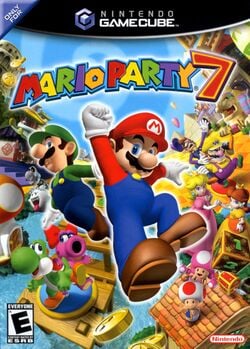 North American box art For alternate box art, see the game's gallery. | |||||||||||
| Developer | Hudson Soft CAProduction Nintendo SPD Group No.4 | ||||||||||
| Publisher | Nintendo | ||||||||||
| Platform(s) | Nintendo GameCube | ||||||||||
| Release date | |||||||||||
| Language(s) | English (United States) French (France) German Spanish (Spain) Italian Japanese | ||||||||||
| Genre | Party | ||||||||||
| Rating(s) |
| ||||||||||
| Mode(s) | 1-8 players | ||||||||||
| Format | Nintendo GameCube:
| ||||||||||
| Input | Nintendo GameCube:
| ||||||||||
| Serial code(s) | |||||||||||
Mario Party 7 is a party game from the Mario Party series, released for the Nintendo GameCube console. It is the seventh Mario Party home console installment (and the twelfth installment in the overall Mario Party series), and the fourth and final Mario Party installment for the Nintendo GameCube. It was first released in North America and Japan in November 2005, before being released in Europe, Australia, and the United Kingdom in early to mid-2006. This was the last Super Mario game released for the Nintendo GameCube in Europe and Australia; in Japan and North America, Super Mario Strikers holds this distinction.
Like the previous Mario Party installments, the game is laid out as an interactive board game, where players use Dice Blocks to advance in the board, while also playing various minigames. In this game, Mario and the gang, using the MSS Sea Star, go vacationing to locations based on landmarks on Earth. However, Bowser is not invited on the cruise and decides to cause trouble for Mario and his friends.
Up to four players can enjoy the most of the game's modes; however, a special mode that this game introduces to the Mario Party series allows up to eight players to participate in a party. Players are required to share their controllers, and thus, controls are simplified in such modes. Mario Party 7 also makes greater use of the microphone, first introduced in the game's predecessor, Mario Party 6; being used in certain modes and minigames. Mario Party 7 requires 6 blocks on the Memory Card to save the game, and up to three game files can be saved.
Story[edit]
From the Mario Party 7 instruction booklet:
TOADSWORTH: Oh, I say! Hello there! It's me, Toadsworth! Yes, yes, let me tell you about what happened recently. You see, Mario and his friends are always busy fighting evil and saving the world and so forth, so I offered him a chance to come on a cruise around the world! Oh ho! Splendid! But in doing so, I apparently made that rogue Bowser somewhat angry. Let me tell you what he said...
BOWSER: "This makes me MAAAAD!! GRRRAAAA!! They're going on a vacation... AND NOT TAKING ME! They want a fun vacation? I'll give them a fun vacation! And by that, I mean NO FUN AT ALL! I'll find those chumps and wreck their good times! Bwa ha ha ha!"
TOADSWORTH: Great Kippers! That King Koopa has never been that angry! Who knows what he'll do? But chin up, old bean! We won't let him ruin our good times, right? Right!
One morning, Mario is taking his morning walk when he meets Toadsworth, who invites Mario and all his friends to go on a luxury cruise around the world. However, Toadsworth ends up excluding Bowser from the invitation. Furious due to being omitted, Bowser vows revenge. When the cruise ship, the MSS Sea Star, arrives at its first destination, the passengers discover that Bowser has turned their vacation paradise into a stress-filled place of pandemonium.
After conquering the boards, the player enters Bowser's Castle for their final showdown against Bowser, in which they eventually are able to use the power of the Stars they gathered to send Bowser and the Koopa Kid crashing down. The epilogue sees the two landing on a tiny island with a tree and feeling dizzy afterwards until they catch sight of the player, who is waving at the duo from aboard the MSS Sea Star as Bowser says that he will not forget this.
Gameplay[edit]
Mario Party 7 features game boards on which players and CPU characters move around on spaces similar to a board game. Players roll the Dice Block with numbers from one to ten to advance on the board. At the beginning of the game, players can hear an explanation of the board's objective, as well as various other quirks the board may have. The turn order is then determined by a Dice Block roll, with the higher numbers going sooner. Each player starts off with ten coins, and the number of coins is affected by the spaces that the player lands on after their turn, as well as multiple other factors. For example, landing on a Blue Space gives a player three coins, while landing on a Red Space takes three coins away. The boards feature a variety of spaces that have different effects, and players can collect items known as Orbs (a feature returning from Mario Party 6) from Orb Spaces, buying them at Orb Huts, or winning them from Green Spaces. The items can be used to have different effects, which help players or hinder an opponent's progress.
After each player has completed their turn, a minigame is played. The type of the minigame is determined by the colors of the spaces that the players ended their turn on. When all colors match, a 4-Player minigame is played, otherwise there is a 1-Vs-3 or a 2-Vs-2 minigame. In Mario Party 7, minigames may involve clearing action courses, solving puzzles faster than the other players, or fighting against each other, but all rules and controls vary between minigames. Several minigames use the Nintendo GameCube Microphone that is shipped with the game and plugs into Memory Card Slot B. Players can play microphone minigames without the device by adjusting the game settings. Winning players earn ten coins; however, some minigames are dependent on their category, such as the special Bonus minigames (which are mixed in with the normal minigame categories; they are marked by a yellow name), Battle minigames, Duel minigames, DK minigames, and Bowser minigames. Various minigames have specific conditions to play in them: Battle minigames occur at random, rare intervals where players have their coins put at stake and the reward is dependent on how well the player has done. Duel minigames are triggered by Duel Spaces, where players can win Duel minigames for a prize picked by a roulette, a change from the two preceding installments, Mario Party 5 and Mario Party 6, where players are required to put coins and Stars at stake to play. DK and Bowser minigames occur when players land on their respective places; a new feature exclusive to Mario Party 7 is that single-player DK and Bowser minigames are thrown into the mix of multiplayer DK and Bowser minigames. Once a minigame after every turn is completed, the game is saved and players resume their turns on the board.
At the last four turns, the Last Four Turns Event occurs. Bowser appears to give Koopa Kid the current standings, while also inviting the last player or team to spin the bonus wheel. Some of the effects can help or hinder the players on the board, where one of them triples coins earned on Blue and Red Spaces while others involve Bowser Spaces being placed on all Red Spaces.
The main objective of any Mario Party game is to gain Stars that are located at a special location in the board. In Mario Party 7, each board offers its unique way to obtain stars, unlike most preceding games in the Mario Party series where there is only one way to obtain stars. At the end of every game, Toadsworth announces the game's current Star count and final coin count. After that, there will be three Bonus Stars for the players who did the best during the course of the game. The player with the most Stars overall wins the game. If there is a tie for Stars, then the winner will be decided with coins (Dice Blocks if the final coin count is the same).
A new addition to the board gameplay is Bowser Time. After each turn, a special gauge representing Bowser's head appears on the screen to tell the player when that time comes; the meter fills up every turn. When the gauge is filled, Bowser Time is initiated. During this special event, Bowser comes to the board and causes trouble in various ways; some are general while others are specific to the board being played on. This special event happens every five turns; in the Last Four Turns event, the gauge stops appearing after every turn.
After every session, whether on board gameplay in Party Cruise or playing minigames in Minigame Cruise, Cruise Mileage Points are earned. These are used to spend on various items at the Duty-Free Shop.
One change has been made to Tag Battle in Mario Party 7. Unlike previous installments, where both players in a team move separately, both players in a team move at the same time by hitting two Dice Blocks from 1-5. Also, both players may be able to participate in certain board events by landing on a Green Space. Players alternate between the leader every turn, where initially, the first leader is determined by the controller order. Leaders make the decisions such as using Orbs, visiting Orb Shops, or making choices in board events. If a human-controlled player is partnered with a CPU player, the human-controlled player is always the leader.
Game modes[edit]
Toadsworth is the host of Mario Party 7, and he guides players through the various modes of the game. At the main menu selection screen, players can get a small description for each of the six game modes and navigate different ways to play through this screen. The game modes are themed after pleasure voyages on a ship and a ship's various locations.
Party Cruise[edit]
Party Cruise is Mario Party 7's main mode. Up to four players can play the game normally, but the mode also features a 4-Team Battle, where four teams of two players can compete against one another. This game mode uses the default Mario Party rules to play: players win by collecting the most Stars on the board.
Before any game is started, players can adjust various settings, which are the following:
- Turns: The number of turns that the game takes to be finished can be set between 10 and 50 turns in 5 turn intervals.
- Rules: Players can play in Battle Royale, where four players compete in a free-for-all, Tag Battle, where four players split into two teams, and 4-Team Battle where eight players divide into four teams. Whenever players are in teams, coins, Stars, and Orbs are shared with a teammate.
- Bonus Stars: Players can either opt for receiver three Bonus Stars awarded at the end of the game or not. The three Bonus Stars are randomly awarded for six of the following achievements:
- Minigame Star: Most coins earned in minigames.
- Action Star: Most Green Spaces landed on.
- Orb Star: Most Orbs used.
- Shopping Star: Most coins used to buy Orbs.
- Red Star: Most Red Spaces landed on.
- Running Star: Most spaces walked over in total.
- Minigame Sets: By default, all available minigames are played. Players can restrict the minigames to only being Easy games, Action games, Skill games, or Weird games.
After these settings are confirmed and the number of players selected, players choose their characters. If there are not enough players, CPU players can be chosen to fill up extra slots; players can adjust CPU player difficulty from Weak, Normal, Hard, or the unlockable Brutal difficulty. Players can then adjust the number of Stars a team or a player can start with with the Handicap feature to give an advantage; up to nine Stars can be initially given. Once these settings are all set, the game can be started.
Players can access the pause menu by pressing ![]() . Here, players can view how many turns they have left, how full the Bowser Time gauge is, and toggle more settings. These are the following settings available:
. Here, players can view how many turns they have left, how full the Bowser Time gauge is, and toggle more settings. These are the following settings available:
- Player Control: Players can switch between a character being human- or CPU-controlled and the CPU difficulty through this menu. Unlike previous Mario Party games, at least one character must be human-controlled.
- Minigame Instructions: Players can choose to view or skip minigame instructions.
- CPU Minigames: Players can choose to view or skip minigames and board events only involving CPU players.
- Minigame Sets: Players can change the current minigame set to All, Easy, Action, Skill, or Weird games.
- Rumble Feature: Players can toggle controller rumbling on or off.
- Message Speed: This setting can change the speed messages are displayed. The speeds are slow, normal, and fast.
- Mic: Players can turn the mic on (to play Mic minigames using an actual mic), set it as controller (to play Mic minigames using
 to bring up a menu) or turn it off (to turn off Mic minigames).
to bring up a menu) or turn it off (to turn off Mic minigames). - Quit: This quits the game and returned to the mode selection screen. Players can choose to leave off where the game was last saved.
Solo Cruise[edit]
Solo Cruise is the single player mode of this game, though up to two players can participate. The gameplay is very similar to Party Cruise save for several key differences. All games pit one player against another player, either controlled by the CPU or a human player, though players need to play against the CPU player in order to progress through this mode. When players first start the mode out, they are required to register a character and name as player data. Players can also create their own pregame and victory messages.
Once everything is set up, players can pick a board; these boards are shorter than Party Cruise and offer different objectives than Party Cruise's objectives. For example, in order to win in Pyramid Park, a player needs to retrieve the stolen Star and give it back to the Bowser Sphinx. The spaces also give a slightly different coin amount to a player upon landing on one in this mode. Blue Spaces give 5 coins, Red Spaces take 5 coins, and Character Spaces give 10 coins. If 30 turns have passed and no player has cleared the objective yet, the game will end in a tie. Bowser only steals half of the player's coins if they lose a Bowser minigame. Bowser Time does not appear in this mode, and Bowser does not scatter three Koopa Kid Orbs across the board.
Players need to clear all boards against the CPU player before they can unlock Bowser's board, Bowser's Enchanted Inferno!. If they win Bowser's minigame, Bowser's Lovely Lift!, against the CPU, they unlock the board, become the Solo Cruise champion and can leave their name and comment on the ranking board.
Deluxe Cruise[edit]
Deluxe Cruise is a mode specifically created for 8 player support in Mario Party 7. In this mode, players need to share their controllers with another person; one player controls ![]() and
and ![]() while the other player controls
while the other player controls ![]() and
and ![]() . Players can then choose the number of human or CPU players playing, up to 8 different characters, and then choose from two of the available game modes.
. Players can then choose the number of human or CPU players playing, up to 8 different characters, and then choose from two of the available game modes.
- 8-Player Free Play: Players can freely choose one of the 12 available 8-player minigames to play. Unlike the Free-Play Sub in Minigame Cruise, all 12 minigames are available from the start.
- 8-Player Ice Battle: Players compete with each other to reach the central island. Every time players win a minigame, an ice block is created, and once the ice block path is fully connected, the players win. Players can choose from three different rules.
- 8-Player Battle Royale: All players compete against each other, with only individual battle minigames.
- 8-Player Team Battles: Players split into teams of two, having four teams in total. Only team minigames are played.
- 8-Player Combined Battles: The same as 8-Player Team Battles rules, except the minigames alternate between individual minigames and team minigames. The combined results determine the winning team.
Minigame Cruise[edit]
Players can play with the minigames they have unlocked in Party Cruise or Solo Cruise. Up to four players can participate playing one of the six modes specifically designed around minigames.
- Free Play Sub - Players are able to play any unlocked minigame they choose. They may also obtain 2 Rare minigames by purchasing them in the Duty-Free Shop, which can be played only in the Free Play Sub.
- Volcano Peril - As the name suggests, this mode takes place in a volcano. After picking the number of victories (3, 5, 7) and the type of minigames (4-Player, 2-Vs.-2, 1-Vs.-3), the four characters race from some bolts. After each game, the character(s) who won rise one level. There is no penalty for losing. The first character (or team) to beat the required amount of games wins. They escape(s) from the volcano while the others get trapped in the skeleton of a dinosaur. In the sky, a Shy Guy on an airplane flies back and forth, spewing stars made out of smoke from the back. To play this game, players need to unlock at least one 4-Player, 1-Vs.-3, and 2-Vs.-2 minigame.
- Waterfall Battle - In order to win, a player must beat every other player in a Duel minigame. Players that lost a minigame have a chance for a comeback victory, if the person they lost against gets beaten. The game is won when there are no other players left to battle. In order to play this mode, at least one Duel minigame has to be unlocked.
- Pearl Hunt - Four characters are placed in a capsule underwater while seashells are placed around them. After beating a minigame, whoever won can select a shell. If it is a pearl with the winner's face on it, that player collects it. However, if it is not the winner's face, the shell closes. The player can find Mushrooms or Super Mushrooms to choose additional shells in a turn, a Bob-omb that briefly opens surrounding shells, or whirlpools that shuffles the order of the shells. The first one to collect three pearls that have their image on it wins the game, then appears in a giant shell, while the others are chased around by a shark. To play Pearl Hunt, players need to unlock at least one 4-Player minigame. If more than one person wins or it is a tie, nobody gets to open a shell.
- Decathlon Castle - Players play from a set of ten minigames to earn the most points, dependent on how well they performed in the minigame. The game can be played in two ways: players can either play from the standard ten minigames or from five randomly selected minigames. Since each minigame gives up to a maximum of 1000 points, top scores are only saved when the standard ten minigames ruleset is played. Players can view their top scores in the Duty-Free Shop. The following minigames must be unlocked to play this game: Track & Yield, Fun Run, Snow Ride, Target Tag, Pokey Pummel, Take Me Ohm, Kart Wheeled, Helipopper, Monty's Revenge, and Air Farce.
- King of the River (unlockable) - This mode is a game for one player only. Single players play a set of minigames with a limited supply of lives. Each time the player fails to win a minigame, one life is lost; if all lives are lost, the game ends. Koopa Kid shows up between 6-10 minigames, 16-20 minigames, and 26-30 minigames with a multiplayer Bowser minigame. On every five minigames, players can save their progress. It is also possible to recover any lives that are lost, but players cannot hold more than three lives. As the player plays through this game mode, they can advance to higher difficulty levels. For each difficulty level cleared, the player receives a souvenir, which will then be placed in the Duty-Free Shop. The prize received on hard difficulty is a star statue, and when it is accessed in the Duty Free Shop, the surprise action is the end credits.
Duty-Free Shop[edit]
- Main article: Duty-Free Shop
The Duty-Free Shop serves as the game's shop and area that saves the game's records. Whenever players complete tasks, Cruise Mileage Points are earned, which can then be used to spend on various goods on the shop. Players can buy new characters, minigames, difficulty levels, collectable souvenirs, and more. When players buy souvenirs, the item gets relocated to the Souvenir Stand, where players can view them; if players have the microphone enabled, saying "Surprise" at the souvenir causes a special effect. Records are stored in the Travel Diary, where players can view Party Cruise, Minigame, Decathlon Castle, and Staff Records. At the Cruise Sounds menu, players can listen to the various background music and character voices from Mario Party 7. Finally, players can view the Minigame Packages to see which minigame belongs in each minigame set.
Control Room[edit]
The Control Room is Mario Party 7's option mode. Here, players can change various game settings.
- Rumble Feature: Players can turn the Controller Rumble Feature on or off.
- Sound Settings: Players can change the sound to stereo, mono, or surround.
- Mic Settings: Players can toggle the microphone on, off, or while using the controller. If the settings are on, Mic minigames will appear in Party Cruise, and the Mic Spaces are also active. While using the controller, players can press the
 to open up a menu of commands, where they can choose the command they want to use.
to open up a menu of commands, where they can choose the command they want to use. - Mic Test: This tests the microphone if it is working properly.
Playable characters[edit]
Mario Party 7 has twelve playable characters. All playable characters from Mario Party 6 return except Koopa Kid, who has returned to having a non-playable role. The newcomers, as well as the unlockable characters, are Birdo and Dry Bones. In order to unlock them, the player has to spend 1,000 Cruise Mileage Points for each of them at the Duty-Free Shop.
Default partners[edit]
Each pair of partners have their own special Orbs. If two non-default characters are on the same team, they can both receive their special Orbs, but the special Orbs can be obtained and used only by the designated players. For example, if Mario and Peach are on the same team, Peach can share her special Flower Orb with Mario, but only she can obtain it and use it.
- Mario and Luigi
- Peach and Daisy
- Wario and Waluigi
- Toad and Toadette
- Yoshi and Birdo
- Boo and Dry Bones
Team names[edit]
Special team names for each pair do not return in this Mario Party installment, unlike its predecessors Mario Party 5 and 6. Rather, they are represented by various marine animals by team order:
- Team Dolphin (Japanese: イルカチーム): The first team in Tag Battle and 4-Team Battle.
- Team Seagull (Japanese: カモメチーム): The second team in Tag Battle and 4-Team Battle.
- Team Tuna (Japanese: おさかなチーム): The third team in 4-Team Battle.
- Team Mollusk (Japanese: かいがらチーム): The fourth team in 4-Team Battle.
Boards[edit]
| Image | Name | Description
|
|---|---|---|
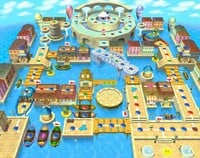 |
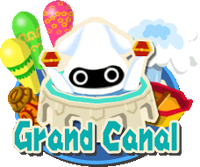 |
Grand Canal is a board based on Venice, Italy. In Party Cruise, players can buy Stars at random, set locations for 20 coins. Once a star has been purchased, the Star Space travels to a different location on the board. In Solo Cruise, the first player to collect two Stars wins. |
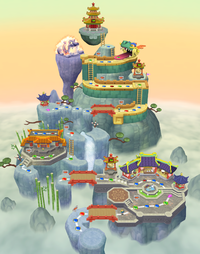 |
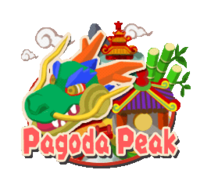 |
Pagoda Peak is a Chinese-themed board. An old Koopa, named the Koopa Master, lives at the top of the mountain. In Party Cruise, he sells a character who reaches the peak of the mountain a Star for the number of coins shown above his house (10, 20, 30, or 40). Each time someone buys a Star from him, the price of each additional Star goes up by ten coins (to a maximum of 40 coins; after that, it restarts to 10). In Solo Cruise, the first player to obtain 100 coins and reach Koopa Master at the peak to trade for the Star wins the game. |
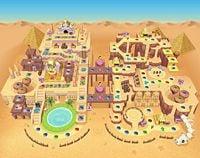 |
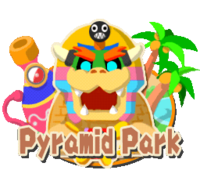 |
Pyramid Park is an Egyptian-themed board. In Party Cruise, the objective of the board is similar to Snowflake Lake of Mario Party 6: players need to pay to ride on Chain Chomps to steal Stars from their opponents. There are three Chain Chomps on the right side of the board that let players ride on it for a price of ten coins for one Dice Block (or 20 for two), and a big Red Chomp on the left side located at the top that lets players use three Dice Blocks for ten coins. In Solo Cruise, the player who retrieves the stolen Star and gives it back to the Bowser Sphinx wins the game. |
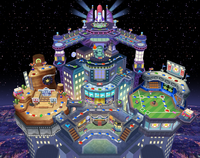 |
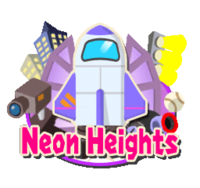 |
Neon Heights is a board based on the United States. On this board, there are three Treasure Chests, which appear in random spots. If a player reaches a chest, Koopa Kid offers to open it for 10 coins. One chest contains a Star, another 20 coins, and the other one contains a Bob-omb, which blasts the player back to Start. Once the Star has been purchased, three new chests appear. In Solo Cruise, the first player to obtain three Stars wins the game. |
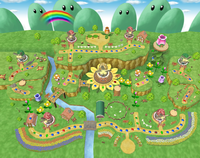 |
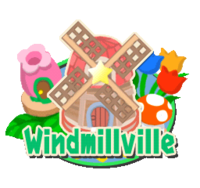 |
Windmillville is a Dutch-themed board. The goal of this board in Party Cruise is to buy as many windmills as possible, for each one contains a number of Stars. The red windmills are worth one Star, the larger green windmills located at both corners of the stage have two, and the largest yellow windmill located in the center of the board has three. Players have to deposit coins to own a windmill and its Stars, but opponents can buy them off by depositing more coins than the previous owner. In Solo Cruise, players need to get stars by depositing coins into broken windmills to fix them. The first player to repair three windmills and get three stars (one for each windmill) wins the game. |
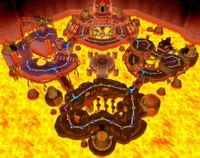 |
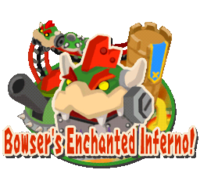 |
Bowser's Enchanted Inferno! is an unlockable, Bowser-themed board. In Party Cruise, players need to find a Star for 20 coins each, the same rules as Grand Canal. In Solo Mode, players have to beat their opponent by getting a Star with the same rules as Party Cruise, then travel back to the start. Bowser then appears to take players to his castle to play the minigame Bowser's Lovely Lift!. Winning that wins the game, and unlocks Bowser's board to be played in Party Cruise. |
Spaces[edit]
| Image | Name | Description
|
|---|---|---|
 |
Blue Space | When players land on this space, they receive three coins (five coins in Solo Cruise). On the last four turns event, the coins players receive may be tripled. |
 |
Red Space | When players land on this space, they lose three coins (five coins in Solo Cruise). On the last four turns event, the coins players lose may be tripled. |
 |
Green Space | When the player lands on this space, an event happens. The event varies on location and board. The event may help or hinder the player or everyone. |
 |
Mic Space | Toadsworth appears and starts a Mic minigame, where the player can bet coins and win double the amount back. If the Mic is turned off, the player cannot play the Mic minigame. |
 |
Duel Space | When the player lands on this space, the player chooses who to duel with. After the opponent has been chosen, a Duel minigame starts and if the player wins, the loser gives away something to the winner, the prize given is decided by a dice block roll. There is a chance, however, that the dice block will show a red X, which means the losing player does not give anything to the winner. |
 |
Donkey Kong Space | When the player lands on this space, Donkey Kong appears and starts one of two minigame types. In a Single-Player DK minigame, the player who landed on his space gets a chance to win 20 coins, 30 coins, or even a Star, if the player can beat Donkey Kong in the minigame. In a Multiplayer DK minigame, everyone can collect bananas for coins. The events may help the player or everyone. In Solo Cruise, the chance to win a Star in a Single Player DK minigame is replaced by 10 coins. |
 |
Koopa Kid Space | Whenever someone lands on a Koopa Kid Space, Koopa Kid appears and do things such as a Bowser Revolution or Bowser Shuffle. These spaces can be removed by tossing a Roadblock or Thrown Orb at them, or by using the Egg Orb. On the last four turns event, ten additional Koopa Kid Spaces may be placed on the board. |
 |
Bowser Space | When the player lands on this space, Bowser appears and starts one of two types of Bowser minigames that can usually hinder the player who lands on this space or everyone. In a Single Player Bowser minigame, the player needs to finish a minigame before time runs out. If the player wins, Bowser will not steal anything from the player. If the player loses, Bowser will either steal half of the player's coins, all of them, or a Star. In a Multiplayer Bowser minigame, everyone needs to get to the finish line in order to clear the minigame. Any losing players will have to forfeit half of their coins, all of them or a Star. In Team Battle, only one member of a team is required to reach the finish line in a Multiplayer Bowser minigame. Additionally, if a player lands on this space and does not have any coins, Bowser will give the player ten coins, and will not start a Bowser minigame. |
 |
Character Space | This space is created when players toss Thrown or Roadblock Orbs onto Blue or Red spaces. The effect of the space is dependent on the Orb tossed. Owners who land on their space with a Thrown Orb receive 5 coins (10 in Solo Cruise); Roadblock Orbs do not give owners any coins. Other players can overlap Character Spaces with their own Orbs. The character or team emblem represents the owner or owners of the space. |
 |
Coin Block Area | Appearing only in Solo Cruise, this space gives players coins. It does not count towards the total dice roll. The coin amount given is either 5, 10 or 20 coins. |
Orbs[edit]
Orbs make a return from Mario Party 6, all of their mechanics intact, with the introduction of two new categories of Orbs. As in Mario Party 6, Orbs can be obtained by buying them through Orb Shops, passing through Orb Spaces, or winning them through Green Spaces. Orbs are used to help assist a player's progress or to hinder opponents. There are five types of Orbs in the game, each with their own distinct category based on their mechanics. Two types of Orbs can be set up as traps: Thrown and Roadblock Orbs. They can be set only in Blue, Red, Character (barring Roadblock Character spaces), or Koopa Kid spaces.
Self Orbs[edit]
Self Orbs have a green shell and are used on the player.
| Image | Name | Description
|
|---|---|---|
 |
Mushroom Orb | "Move with two Dice Blocks." |
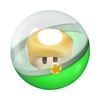 |
Super 'Shroom Orb | "Move with three Dice Blocks." |
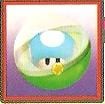 |
Slow 'Shroom Orb | "The Dice Block will move slowly." |
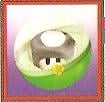 |
Metal Mushroom Orb | "Encase yourself in metal and move without being harmed by rivals' traps." |
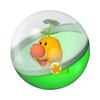 |
Flutter Orb | "Flutter will appear and fly you straight to where the Star is!" (Grand Canal and Bowser's Enchanted Inferno! only) |
 |
Cannon Orb | "It'll send you flying to the upper part of the board." (Pagoda Peak only) |
 |
Lakitu Orb | "Lakitu will bring you a treasure chest!" (Neon Heights only) |
 |
Snack Orb | "Prevents a Chain-Chomp from stealing you once. Lasts for three turns." (Pyramid Park only) |
Thrown Orbs[edit]
Thrown Orbs are traps that can be throw on a space. If an opponent lands on the space, various effects occur. The Thrown Orbs' shell color is yellow. These orbs have an effect on a player who lands on the space. If the owner lands on the space, they will receive five coins. During the last four turns event, they may receive 15 coins if the ×3 coins is chosen on the roulette. The orb stays on the board as long as no one replaces the orb or the Star space does not overlap it.
| Image | Name | Description
|
|---|---|---|
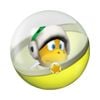 |
Hammer Bro Orb | "Take 10 coins from any opponent who lands on it." |
 |
Piranha Plant Orb | "Any opponent who lands on it must give you half of their coins." |
 |
Spear Guy Orb | "Any opponent who lands on it must give you coins equal to a Dice Block roll." |
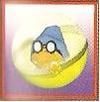 |
Kamek Orb | "If an opponent lands on it, you can take over up to three of his or her character spaces." |
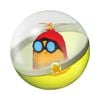 |
Toady Orb | "Take an orb from an opponent who lands on it." |
 |
Mr. Blizzard Orb | "If an opponent lands on it, he or she will lose every Orb." |
 |
Bandit Orb | "Whoever lands on it will lose coins from a windmill." (Windmillville only) |
 |
Pink Boo Orb | "A foe who lands here will lose a Star. If the foe doesn't have any stars when they land here, they lose 20 coins." |
Roadblock Orbs[edit]
Roadblock Orbs are orbs with red shells and can be thrown on spaces. They are triggered when an opponent passes them and disappear once triggered.
| Image | Name | Description
|
|---|---|---|
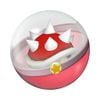 |
Spiny Orb | "Any opponent who passes it will lose 10 coins." |
 |
Zap Orb | "Any foe who passes it loses three coins for every space he moves past it." |
 |
Tweester Orb | "Any opponent who passes it will be blown to another space." |
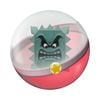 |
Thwomp Orb | "Any opponent who passes it will get Thwomped and must stop moving." |
 |
Warp Pipe Orb | "Any opponent who passes it will be warped to the space where they started their movement." |
 |
Bob-omb Orb | "Any opponent caught in the explosion will get thrown for a loop!" (Pagoda Peak only) |
Character Orbs[edit]
Character Orbs are orbs that only can be used by a specific pair of characters. Their shells are blue and always cost 15 coins at the shop.
| Image | Orb | Used by | Description |
|---|---|---|---|
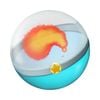
|
Fireball Orb | Mario and Luigi | "Hit an opponent in front of you to steal his or her coins." |

|
Flower Orb | Princess Peach and Princess Daisy | "Spaces ahead of you will change to flower spaces, letting you ignore traps. You get 3 coins for every space you move." |

|
Egg Orb | Yoshi and Birdo | "Eat character spaces and symbols in your path and turn them into eggs. Eggs will become orbs after moving." |

|
Vacuum Orb | Wario and Waluigi | "Spin the wheel and take away whatever number you end up with from your opponents." |

|
Magic Orb | Boo and Dry Bones | "Use powerful magic to turn invisible and double your Dice Block rolls for 2 turns." |
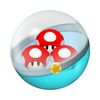
|
Triple 'Shroom Orb | Toad and Toadette | "Use the power of 3 mushrooms to double your Dice Blocks for 3 turns." |
Other Orbs[edit]
Other Orbs are orbs that are automatically thrown when somebody receives them. They are colored violet and cannot be found in Orb Shops, nor can they be won in Green Spaces.
| Image | Name | Description
|
|---|---|---|
 |
Koopa Kid Orb | "If you get this, Koopa Kid will show up and make a Koopa Kid space. How annoying!" |
Minigames[edit]
- Main article: List of Mario Party 7 minigames
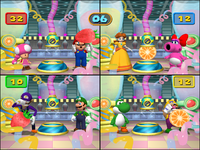
Mario Party 7 has 88 minigames, the most of any numbered Mario Party game. These include the traditional 4-player minigames, 1-vs.-3 minigames, 2-vs.-2 minigames, duel minigames, and battle minigames. Similarly to its predecessor, it employs the Nintendo GameCube Microphone for several 4-player and 1-vs.-3 minigames. Unique to this game are 8-player minigames. This game also includes DK minigames and Bowser minigames, both of which have three single-player and four-player minigames. Finally, there are two rare minigames and one boss minigame, the latter of which is categorized as a Bowser minigame.
Staff[edit]
- Main article: List of Mario Party 7 staff
The game was developed by Hudson Soft, who was responsible for developing all Mario Party titles before Mario Party 9, and it was published by Nintendo. Shuichiro Nishiya, who was the previous director of Mario Party 6, would go on to direct Mario Party 7, as well as Mario Party 8, Mario Party 9, and Mario Party 10. The game's soundtrack was composed by Hironobu Yahata and Shinya Outouge, the same composers for Mario Party 6's soundtrack.
Bowser's Lair Hockey[edit]
- Main article: Bowser's Lair Hockey
To promote the release of Mario Party 7, a browser game called Mario Party 7 -- Bowser's Lair Hockey was playable on the Mario Party 7 official site and the Nintendo Arcade. It is an air hockey game where the player, labeled "NICE", is Toad, and the computer, labeled "MEAN", is Bowser. The game is sixty seconds long, and the player with the most points at the end wins.
Reception[edit]
Critical reception[edit]
Mario Party 7 has received mixed to positive reviews, with aggregate review sites Metacritic scoring it a 64 based on 25 reviews[1] and GameRankings giving the game a score of 65.39% based on 28 reviews.[2] Critics generally cite how similar the game plays to the rest of the Mario Party games, where they recommend it to seasoned Mario Party players or players who want a minigame collection to play with family or friends, but cannot draw in people who do not like the earlier entries of the Mario Party series.
Ryan Davis of GameSpot gave the game a 6.5/10, saying that the game was a huge improvement.[3] He praised the controls, the challenging Bowser minigames and more usage of the mic, and mentioned that Mario Party 7 is an actual party because of the use of 8-player modes and that the game really gets the whole family to join in the fun. However, Davis notes how the game is short on the originality department, where he states that 8-Player minigames are the only innovation Mario Party 7 has going for it. Matt Casamassina of IGN gave the game a 7/10, noting the fun multiplayer experience, the 8-Player minigames, and the huge number of minigames, but also notes how the franchise is aging and that the single player experience is disappointing.[4] He ended with "Mario Party 7 is still entertaining, but I'd be a liar if I wrote that I'm not growing bored with new iterations of the same old formula. To its credit, the title delivers some fun new boards and mini-games, and the multiplayer experience is as robust and enjoyable as ever. But it in contrast dishes out a worthless single-player mode marred by tediously slow computer-controlled character interactions. And the overall presentation of the story, cut-scenes and real-time achievements is only passable."
Ellie Gibson of Eurogamer gave the game a scathing review, criticizing the unoriginality and sheer tedium of the game, despite noting how some of the minigames are fun, giving the game a final verdict of 3/10.[5] On the other end, Dave 'Fargo' Kosak gave the game a 4 out of 5 Stars, while noting the similar feel it has to other Mario Party games and that it is running out of gimmicks, but has commented that it is slightly better than the last Mario Party game and that no other game franchise does the party formula as good as Mario Party has done.[6]
| Reviews | |||
|---|---|---|---|
| Release | Reviewer, Publication | Score | Comment |
| Nintendo GameCube | Nintendo Power | 7.5/10 | "Adds some nice new features to the tried-and-true formula." |
| Nintendo GameCube | Ryan Davis, GameSpot | 6.5/10 | "It's not dramatically different from Mario Party 6 or, frankly, any of the other Mario Party games, but as a cheery collection of simple pick-up-and-play minigames that's well suited for younger and more-casual players, it still works." |
| Nintendo GameCube | Matt Casamassina, IGN | 7/10 | "A decent sequel to an aging franchise. It will probably sell like hotcakes. But the only people that should truly be interested in it are those dedicated to multiplayer parties. Everybody else can either make due with last year's version or avoid the series altogether." |
| Nintendo GameCube | Ellie Gibson, Eurogamer | 3/10 | "It's such a shame that Nintendo - the creator of Mario Kart, which is arguably the most fun you can have with platonic friends - just can't seem to sort Mario Party's problems out, even for the seventh installment in the series. Roll on number eight, eh." |
| Nintendo GameCube | Jared Rea, 1UP | D+ | "The problem with Mario Party is this: the downtime is completely ridiculous. In a game where the sole purpose is to entertain you in a party-like environment, sitting out for periods of up to 10 minutes at a time, waiting for everyone to roll the dice, run around, shop for items, use said items, compete in stale, single-player mini-games, pointless microphone games and other random events drives one to tears of boredom." |
| Nintendo GameCube | Dave Kosak, GameSpy | 4/5 | "It's better than the last game but not all that innovative. Of course, until somebody else steps up and makes a great party game, Mario Party's the only gig in town." |
| Aggregators | |||
| Compiler | Platform / Score | ||
| Metacritic | 64 | ||
| GameRankings | 65.39% | ||
Quotes[edit]
- Main article: List of Mario Party 7 quotes
- "It's everybody's favorite time, BOWSER TIME!" -Bowser
- "Ready? Here we go! Hang on tight!" -Flutter
- "Let's see how I can make your life miserable this time. Hmm... Oh, I know!" -Koopa Kid
- "Training is like a road on the horizon with no beginning and no end. Keep training hard, young one." -Koopa Master
- "Well, what would you like to do? Make a choice, I say!" -Toadsworth
Differences from other Mario Party games[edit]
- This is the first Mario Party game to not show/use a separate "Battle Results" screen after a battle minigame is finished during Party Cruise; instead, the coins are doled out to the players on the normal results screen.
- This is the first Mario Party game to not directly show the placement of the characters (besides from 1st place) during the award ceremony before the final winner(s) are declared.
Pre-release and unused content[edit]
- Main article: List of Mario Party 7 pre-release and unused content
Mario Party 7 has very similar unused content to that of Mario Party 5 and Mario Party 6. The debug minigame menu is simply an update from the one used in the first three Mario Party games, and players can view the animation debug through a similar cube used in Mario Party 5. An unused title screen can be loaded with Action Replay codes; this title screen shows Mario on the MSS Sea Star with various characters on islands in the background.
Gallery[edit]
- For this subject's image gallery, see Gallery:Mario Party 7.
Media[edit]
- For a complete list of media for this subject, see List of Mario Party 7 media. For this subject's sound test, see Mario Party 7 sound test.
| File info 0:30 |
| File info 0:30 |
| File info 0:30 |
| File info 0:30 |
| File info 0:30 |
| File info 0:30 |
References to other games[edit]
- Donkey Kong: The minigame Jump, Man is based on the Donkey Kong arcade game, especially because the objective is for player characters to reach the top while avoiding barrels. In the minigame's rules, Toadsworth even states that the minigame looks familiar.
- Super Mario All-Stars: In the minigame StratosFEAR!, the Brick Blocks and ? Blocks in the background use their designs from Super Mario Bros. and Super Mario Bros.: The Lost Levels.
- Super Mario Sunshine: Toadsworth reappears from this game as the host, and his voice clips are recycled from this game as well. Also, Mecha-Bowser makes a cameo in Bowser's Enchanted Inferno!
- Mario Party 4: A picture of Peach's Castle as it appeared in this game can be seen in the Duty-Free Shop. The Japanese version of Mario Party 7 reuses the announcer originally from this game. Most animations are reused.
- Mario Party 6: A portion of Mario Party 7's songs are cover versions of songs in this game. For example, the song that plays on the main menu is a cover version of the Castaway Bay theme; the song that plays when a player lands on a Mic space is a cover version of the Speak Up theme; the song that plays in King of the River is a cover version of the song that plays in Endurance Alley (which, in turn, is a cover version of the Super Mario Bros. underground theme); the song that plays when the player loses King of the River is a cover version of the song that plays when the player loses Endurance Alley or Solo Mode (which itself is a cover version of the theme that plays when the player loses in Story Mode in Mario Party 5). The music when winning a minigame is also a more upbeat version of Mario Party 6's winning theme, and the minigame instructions theme contains a cover of Mario Party 6's rendition in it. Pyramid Park also takes the idea of using Chain Chomps to steal Stars from Snowflake Lake in this game. Pink Boos act the same here as they did on Towering Treetop and Castaway Bay, but they now appear when an opponent lands on a Character Space created by a Pink Boo Orb. Also, all voice clips and the announcer are reused.
- Super Mario 64 DS: This is the first Mario Party game to use the more modern appearance of some enemies, such as Mr. Blizzards and Thwomps, from this game onwards.
References in later games[edit]
- Mario Kart Wii: On Bowser's Castle, the artwork of Boo and Dry Bones from this game can be seen on the Showtime! billboard. Toadette's artwork is reused, with her kart added to it. Some of Birdo's voice clips are reused.
- Super Smash Bros. Brawl: The solo artworks of Dry Bones and Toad, as well as the team artworks of Peach and Daisy, and Toad and Toadette, appear as stickers.
- New Super Mario Bros. Wii: Luigi's artwork is used on the back cover of the Japanese game box.
- Super Smash Bros. for Wii U: When clearing Classic Mode as Rosalina, the image shown at the end of the credits roll resembles Peach and Daisy's team artwork from this game.
- Mario Party: The Top 100: Twelve minigames from this game return.
- Super Smash Bros. Ultimate: Birdo's artwork is reused for her spirit in this game.
- Mario Party Superstars: Six minigames from this game return.
Names in other languages[edit]
| Language | Name | Meaning | Notes |
|---|---|---|---|
| Japanese | マリオパーティ7[?] Mario Pāti 7 |
Mario Party 7 | |
| Chinese (traditional) | 瑪利歐派對7[7] Mǎlì'ōu Pàiduì 7 |
Mario Party 7 | |
| Spanish (NOE) | Mario Party 7[?] | - |
Trivia[edit]
- Mario Party 7 contains text that is considered inappropriate in the United Kingdom. In Grand Canal, if the player chooses to hear advice about the board from Toadsworth, he says the following: "The Star will move to another location when someone gets one. What a crafty bugger!" Despite this, the game was not recalled or edited and it did not affect the PEGI 3+ rating, unlike other games (such as Super Mario RPG: Legend of the Seven Stars) that contain this word.
- This is the last Mario Party game to use a female announcer in the Japanese version until Super Mario Party.
- In 2005, Tomy released finger puppets to celebrate the launch of the game, depicting Mario, Luigi, Peach, Yoshi, Wario, Daisy, Waluigi, Toad, Boo, Bowser, and Donkey Kong.
References[edit]
- ^ Metacritic score of Mario Party 7. Metacritic. Retrieved August 27, 2016.
- ^ GameRankings score of Mario Party 7. GameRankings. Retrieved August 27, 2016.
- ^ Davis, Ryan (November 11, 2005). Review of Mario Party 7. GameSpot. Retrieved August 27, 2016.
- ^ Casamassina, Matt (November 7, 2005). Review of Mario Party 7. IGN. Retrieved August 27, 2016.
- ^ Gibson, Ellie (January 2, 2006). Review of Mario Party 7. Eurogamer. Retrieved August 27, 2016.
- ^ Kosak, Dave (November 29, 2005). Review of Mario Party 7. GameSpy. Retrieved August 27, 2016.
- ^ 瑪利歐歷史|超級瑪利歐兄弟 35週年|任天堂. Nintendo HK (Traditional Chinese). Retrieved June 25, 2024.
External links[edit]
| Nintendo GameCube games | |
|---|---|
| Super Mario franchise | Luigi's Mansion (2001) • Super Mario Sunshine (2002) • Mario Party 4 (2002) • Mario Golf: Toadstool Tour (2003) • Mario Kart: Double Dash!! (2003) • Mario Party 5 (2003) • Paper Mario: The Thousand-Year Door (2004) • Mario Power Tennis (2004) • Mario Party 6 (2004) • Dance Dance Revolution: Mario Mix (2005) • Mario Superstar Baseball (2005) • Mario Party 7 (2005) • Super Mario Strikers (2005) |
| Donkey Kong franchise | Donkey Konga (2003) • Donkey Konga 2 (2004) • Donkey Kong Jungle Beat (2004) • Donkey Konga 3 JP (2005) |
| Wario franchise | Wario World (2003) • WarioWare, Inc.: Mega Party Game$! (2003) |
| Other | Super Mario 128 (2000, demo) • Super Smash Bros. Melee (2001) • Nintendo Puzzle Collection (2003) • NBA Street V3 (2005) • SSX on Tour (Nintendo Village) (2005) • Donkey Kong Racing (cancelled) • Diddy Kong Racing Adventure (cancelled) |
